WE ARE
Vera & Donald Blinken
Open Society Archives
ADDRESS
Arany Janos u. 32
H-1051, Budapest
WRITE US
info@osaarchivum.org
CALL US
+36-1/327-3250

Vera & Donald Blinken
Open Society Archives
Activity Report 2020
FOR THE RECORD
"A Dreadful Course of Calamities" befell us at the Vera and Donald Blinken Open Society Archives last year. Some of them were foreseen and expected:
following the eviction of CEU from Hungary, the move of the University from Budapest to Vienna; the difficulties of providing access to archival materials to the students and faculty of CEU; the intensification of the government’s war on culture, research, education and civility; the government’s growing impatience with the past, and the efforts to rewrite wholesale the history of both the country and Europe.
Some of the calamities, however, were (for most of us) unexpected: the fast-emerging indifference, both local and global, to historical facts; and obviously the plague, the pandemic that paralyzed the globe.
We had tried to prepare for the expected disasters. After long and careful preparations, two years ago, we started a highly ambitious digitization program, to have our moving image holdings digitized both for long-term preservation but also for the purpose of providing remote access to our film holdings. By next year, most probably, all our moving images, but also a large part of our photographic collections (consisting of thousands of hours of films and well over a hundred thousand photographs) will be digitized. Our image collections can thus be used in class in Vienna, and students will be able to make use of these important and unique sources in their coursework.

Blinken OSA has set up a so-called “private research cloud” in order to make the digitized part of our holdings, both textual and visual, remotely available, primarily for students and faculty of CEU. All members of the CEU community are able to have remote access to the holdings in the Archive, as if they were doing research in our in-house research room. Since “fair use” copyright exception allows educational and cultural institutions to provide access to copyrighted material for educational purposes, with the help of the research cloud the Archives can make even copyrighted material, including feature films, available to the CEU community.
We were preparing for the foreseeable, the move of the University, but we were unprepared for the invisible, the coming of the virus. When the miasma reached the country, the building of the Archives, with its research and public programs facilities had to be closed down. OSA has started offering a new service: digitization on demand for the research community. We set up a hotline, to let researchers consult with our research services staff, who help remote researchers to find their way around our electronic finding aids, and the staff of the archive tries to satisfy the research needs by immediately digitizing previously undigitized material even when the facilities are under lockdown.
We managed to continue teaching at CEU online, preserving our long-running successful courses, and started to take a very active part in a new Erasmus Mundus program financed in cooperation between the European Union and the Japanese government. The program, “History in Public Spaces” is a pioneering offering in public history in Europe. As part of the two-year M.A. program, (each semester of which takes place in a different cooperating country: Austria-Hungary, Portugal, Italy, Japan) students are supposed to spend an intensive internship month at OSA. Because of the pandemic, we had to improvise a month-long online virtual internship program on archives and on our philosophy of public programs.
The unexpected situation required us to move our public engagements into virtual space. During the first phase of the pandemic, we were offering special readings on the history of pandemics and epidemics, on the philosophical and public policy questions of quarantine, public health, and the possible social and cultural consequences of the pandemic. We continued our public exhibition programs with “Faith-Trust-Secrecy”, religion and religious practices through the lenses of the secret police under Communism; “Post-Soviet”, a photo and an accompanying diary exhibition of the works of Lenke Szilágyi, a member of the Archives staff and one of the most highly regarded contemporary Hungarian photographers; and “From Harvest to Harvest”, a historical exhibition on the turbulent postwar year between mid-1918 and mid-1919, the history of two, nowadays hotly contested revolutions in Hungary. The exhibition and its accompanying programs are part of a multi-year program series to counter the ongoing official historical revisionism in Central Europe and especially in Hungary.
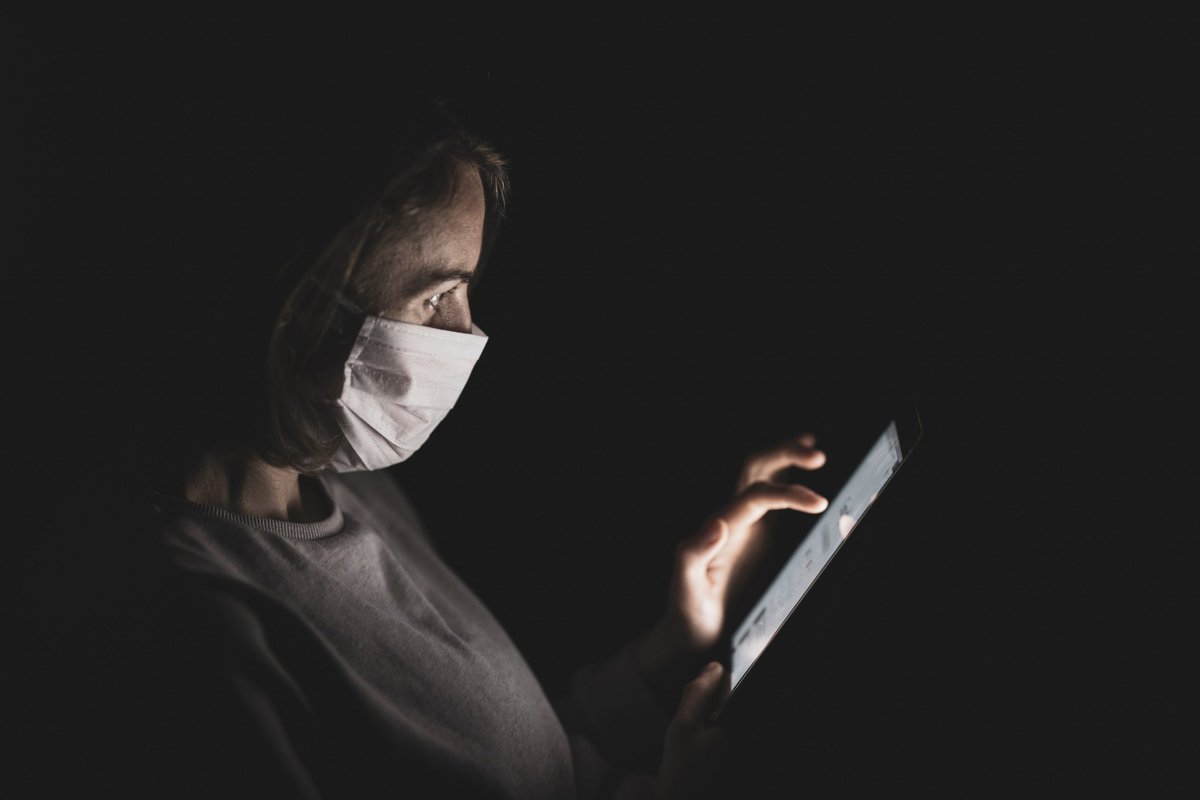
Despite all the difficulties and the lockdown, in the course of the second wave of Covid 19, Verzio, the 16th annual international human rights documentary film festival was organized online with an all-time record number of viewers. With a grant received, following a grant competition by the US Embassy in Budapest, the Archives planned to organize a massive school program on 1989, the year of the political transition. The program was intended to supplement a year-long project whereby with newly available documents, a dedicated website and knowledge source were created to counter with credible factual sources the new revisionist official narrative of the fall of Communism and the political transition. The pandemic made the presence of high school classes in the Archives impossible, so a new virtual program, with software for computer games, had to be developed in order to move the students from the Archives into the virtual space. Our colleagues also managed to continue our high-school teacher training program on the history of the twentieth century, the only available accredited alternative program available in the country.
The year witnessed the complete abolition of academic autonomy in Hungary: the remaining research institutes in the humanities and the social sciences were either closed down or taken over by the government; public universities privatized, i.e., handed over to private foundations appointed by the Prime Minister; new pseudo “research institutes” were created and stuffed with enormous sums of money and important archives of recent history were evicted from their buildings. Blinken OSA remains one of the few, if not the only still existing autonomous, free research center and repository of important historical sources testifying about the past “as it really was.”
Following the defeat of Donald Trump, a close friend of the Hungarian government, the new US President, Joe Biden appointed Antony Blinken, the son of Donald and Vera Blinken as the 71st Secretary of State of the United States.
OSA SUBJECTIVE
I joined the Vera and Donald Blinken Open Society Archives as Archivist for the Slavic Collection in March 2020 - just before the lockdown measures intended to combat the COVID-19 pandemic were introduced in Budapest and the rest of the country. Thus, for the entire year, I was not only accommodating professionally to the new position but also learning how to operate fully and efficiently under extreme circumstances.
My position comes with several tasks: managing, providing access to, developing, and promoting the Slavic language archives and samizdat collections. This means working closely and directly with the materiality of archival documents (physical processing) but also seeking novel ways to engage with researchers and the general public worldwide on the basis of the collections' riches.
These tasks proved to be essential in pandemic times. With limited real-time access to the documents, archivists have opportunities to re-consider the very essence of their thinking about how to produce and deliver knowledge about multi-volume and multipart archival collections. Through thoughtful, informed and engaged cataloging work, data normalization, and intellectual processing, I contribute to ensuring public access to the Slavic and samizdat collections, and I look forward to designing curated collections, digitization, and digital humanities projects.
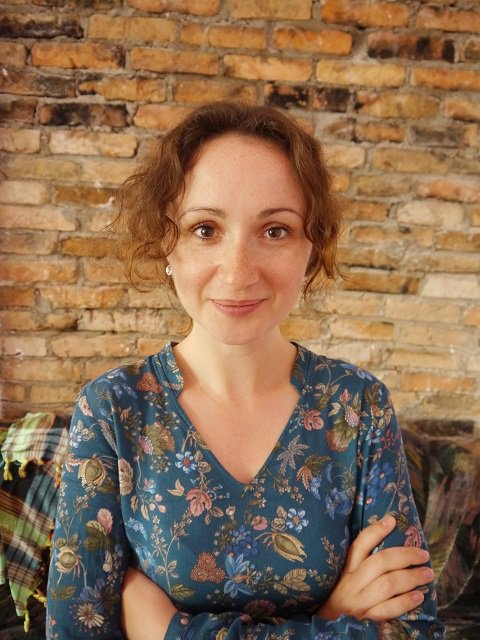
OSA SUBJECTIVE
In 2018, I started working at the Blinken OSA as Project Program Officer, a title enigmatic enough to allow me the flexibility necessary for the creative work through which I believe I can contribute to the Archives. Introducing myself on the Blinken OSA website’s staff page three years ago, I wrote that as Project Program Officer I work on the accessibility of the heritage preserved and created in the Archives—which is something I still believe in. The Blinken OSA preserves an extraordinary collection capturing and addressing issues related to the history of the Cold War and Communism, as well as to human rights in a broader sense. This heritage, although related to the past, bears many lessons for the present as well as the future. Instead of being static, however, the very operation of the Archives constantly guarantees that records here are not only conserved and processed by archivists and researched by researchers, but are also accessible.
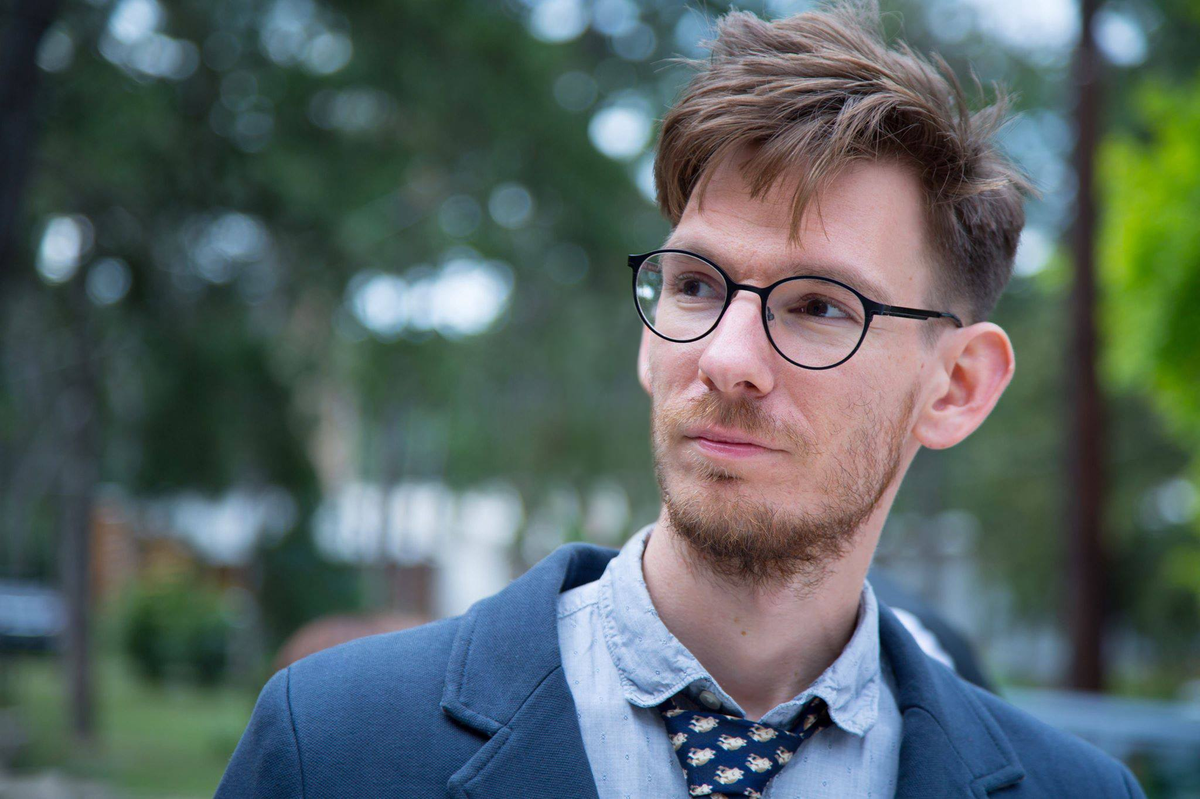
The accessibility of this heritage is crucial; it means a demystification of archives. The textual, visual, audiovisual documents preserved at the Blinken OSA are not only available to privileged scholars but can be studied by anyone (to which digitization and online availability are fundamental). Furthermore, the Archives strives to find, on the one hand, new contexts for archival records by rearranging them into curated collections and public exhibitions, and on the other, new audiences by introducing these records to relevant communities and non-academic forums like news websites and educational programs. My task is to help these attempts either by organizing city walking tours on the history of the regime change for secondary schools or by editing a blog series on a popular, independent news website. I strongly believe that an archives is not merely a repository of documents, but also has the duty of opening the heritage it preserves to the widest possible audience, thus mediating its lessons and values. The pandemic has shown that this mission and the accessibility it requires are more than timely.
THE (FIRST) YEAR OF COVID-19 THINKING
“There are things that can only be thought at the border.
In the transition between one space and another, one time and another.
Certain thoughts are only possible in 2020.
A precious period in that sense: we must make the most of the border.”
Gonçalo M. Tavares
Lockdown. Social distancing. Home office. Travel ban. Online teaching. Remote research.
The global spreading of the deadly coronavirus pandemic in 2020 brought us these challenges, discomforts, and new opportunities. And much more on a personal level.
Central European University moved all teaching programs to Vienna in AY 2020/21.
A hardship that specifically affected Blinken OSA, as a significant part of its constituencies became physically separated from the rich, multilingual archival collections and diverse public programs that constitute the signature brand of the Archives.
But, apparently, we managed to maintain Blinken OSA operational, keep our jobs and perform alternative tasks and duties, as well as cater to our audiences in a dramatically changed environment. There also was plenty of time to reconfigure ourselves.
***
The first lockdown in March 2020 disrupted our physical presence in the Goldberger House and forced us to continue our activities in home office mode. As many of us normally work with databases, web-based applications, and texts, it seemed that this transition manifested only in the changing of the work environment. For our colleagues working with exhibits, facilities and storage management, however, this change was more fundamental but, eventually, we managed to involve them in other archival activities that they had little previous experience with.
Our immediate efforts were focused on facilitating a better use of our online resources. We created a short video guide on How to Do Research at Blinken OSA, adjusted our Research Cloud, launched in the previous year, to accommodate remote researchers outside of the CEU community as well, and began preparations to devise and introduce our digitization on-demand, service. We organized online meetings with our researchers to assist them with navigating the catalog and identifying and locating the necessary archival content. Unfortunately, most of our international Visegrad Scholarship at OSA recipients had to postpone their planned research sessions, as traveling to Budapest remained highly improbable throughout the year.
Concurrently, we broadened our online presence by increasing the frequency of publishing news, announcements, and blog posts on our website and social media platforms. We added a new chapter to our What We Read blog section entitled Pandemic Edition, where our colleagues regularly recommended articles, interviews, or podcasts on the coronavirus pandemic and its multiple and worrisome consequences on public health, authoritarian political regimes, social injustice, and the archival and informational multiverse. Finally, we launched our institutional Instagram page, too.
As the first lockdown hit us in the second part of the Winter Term, we continued teaching our academic courses, such as the long-standing Archives, Evidence and Human Rights, from our home offices and strived to make lectures, seminars, and workshops as intriguing and participative as in normal contact times. Beyond individually developed class strategies, we relied on Blinken OSA’s online resources, including the Digital Repository and Curated Collections, the Research Cloud, and the evergreen Parallel Archive, whose upgrading was already in the preparatory phase.
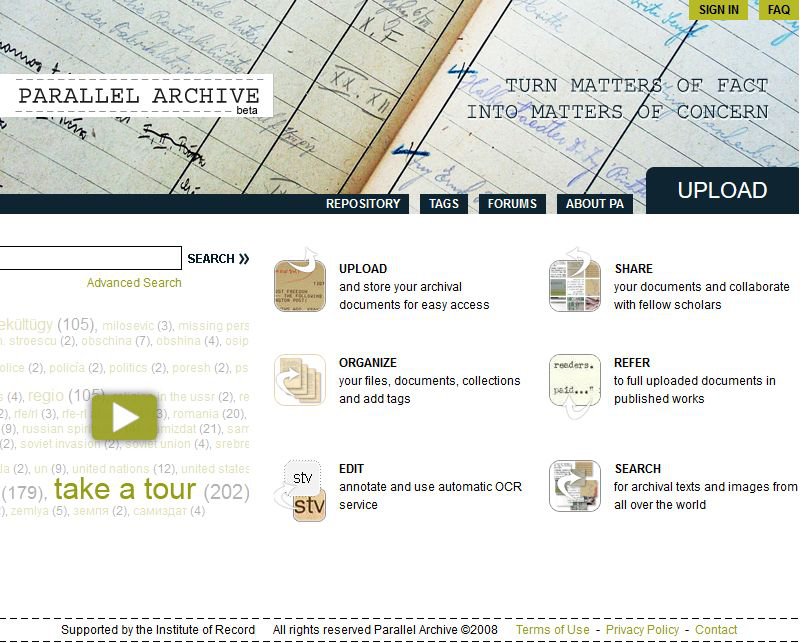
It was a small wonder that we also managed to complete the Archives and Evidentiary Practices Specialization with the maximum number of five students in June. As this special archival training was temporarily suspended afterwards, it is worth mentioning that in four consecutive years, 16 brilliant history students from CEU have received their qualifications. This is quite remarkable for a research university, which does not offer graduate programs in archives, libraries, and information management. After completing their studies, some of the students went on to pursue their PhDs and returned to Blinken OSA as Visegrad Fellows, while others found jobs at important international record-keeping or memory institutions.
Our new courses included seminars dealing with events of the recent past that were comparable with the coronavirus crisis (such as Chernobyl 1986) and introduced catastrophic epistemology and archival ethnography to analyze historical models and methods for understanding complex issues with lethal consequences. Others focused on methods and practices of documentary storytelling and elaborated on the archival method as part of an overview of research methods existing in legal and social sciences.
The 4th season of the free, state-accredited Teacher Training program, which looks critically at concurrent and seemingly irreconcilable narratives and interpretations of traumatic historical events in 20th century Hungary, ended with 20 participants before switching to online mode, but the follow-up 5th and last edition had to be postponed.
Blinken OSA’s educational outreach program for high school students continued in the virtual space with projects on exploring Hungarian society in the 1980s with innovative tools based on archival resources. Two tangible outcomes were an online version of the ’89 Bringing It Home project and a downloadable, 3D computer simulation game entitled 1986. Both were sponsored through a public grant by the US Embassy in Budapest.
The internship program at Blinken OSA was also affected by the strict public health measures, which prompted us to reshuffle and move online two ongoing projects with La Sapienza University (Rome) and George Mason University (Washington DC) interns, respectively. The former concentrated on processing historical records on political relations between the Holy See, the Italian Communist Party, and other Eastern European communist parties from RFE/RL’s Western Press Archives. This resulted in our first-ever Italian language catalog entries. The latter was about fine-tuning functionalities on our Refugee Docs Map, a visual geographic catalog published in 2019, and developing a year-long Twitter campaign that aimed at connecting notable global events on refugees, minorities, human rights, and environmental issues with relevant documentary films listed in the catalog.
As the first wave of the pandemic eased during the summer, we gradually reopened the building, as well as our Research Room with limited capacity and an online booking system.
To make the most of the last academic year when CEU students were on the Budapest Campus en masse and to strengthen our ties with other universities based in the capital city, such as the Eötvös Loránd University, we successfully increased our efforts to recruit student interns and volunteers for other projects, too. These included the pre-processing and metadata enhancement of collections from the heritage of Hungarian sociologists Zsuzsa Horváth and Mihály Csákó, the RFE/RL analyst Kevin Devlin’s files on rival communist parties, a Subject Files series from the Samizdat Archivesweb-based and the Records of the Foundation for the Support of European Intellectuals.
Early November brought us the second lockdown. This time, we routinely moved online and intensified our work within and on developing the web based Archival Management System, whose newest version will be launched in 2021. We enhanced, completed, and published more content in our Digital Repository, among them the Vera and Donald Blinken Personal Papers, the David Rohde Collection on Srebrenica, and the Digital Archive of Cultural Heritage. This latter was done in cooperation with CEU’s Cultural Heritage Studies Program. Our colleagues also added the voluminous, digitized 1989 chapter of the Hungarian Press Survey, as well as item and collection level tags to the Will There Be A 1989? the ,online platform on the Hungarian regime change of 1989.
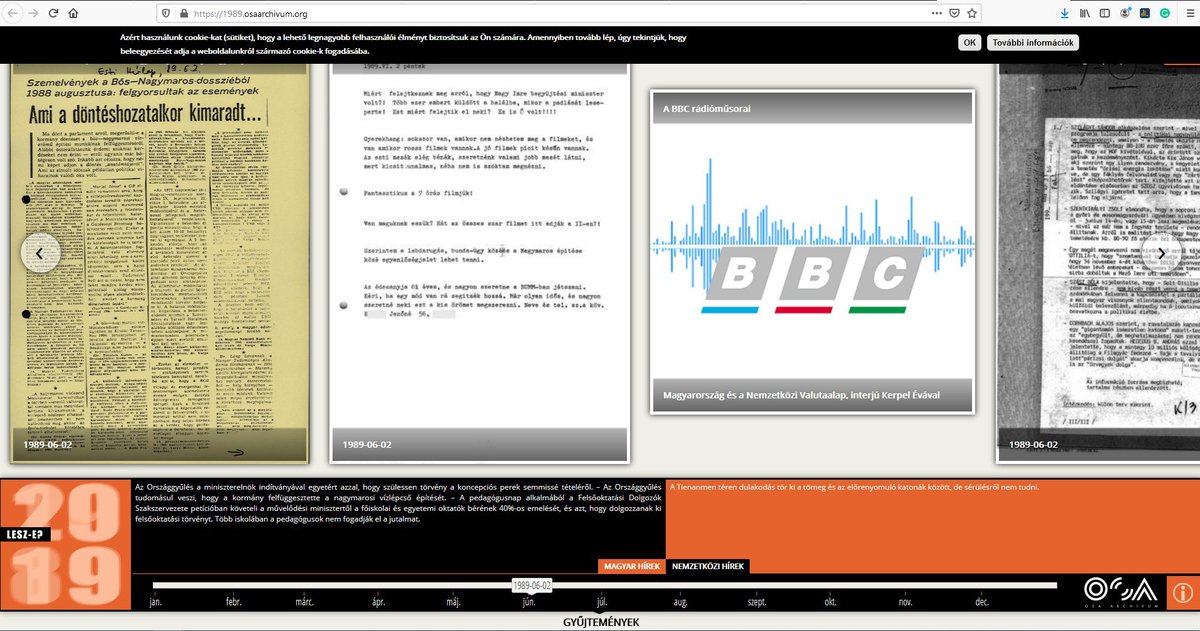
Against all odds, we continued or finished digitizing quite a few important collections, including several thousand items from the Éva Kapitány and Physicians for Human Rights photo collections, the Cambodia and Balkan Archive videos from the International Monitor Institute, the Iraqi State Television Monitoring and the Unedited Video Materials and the Roma Media School films of the Black Box Foundation.
Analog processing progressed in the form of metadata entry, consolidation and translation, preparation of archival descriptions, and publishing of catalog entries online. Results of this meticulous and iterative work can now be seen in numerous series from the Samizdat Archives (HU OSA 300-85-9 to 43) and the files on our own exhibitions (HU OSA 206-2), which contain all planning, research, collected archival and promotional materials connected to exhibits created or hosted by Blinken OSA in the past quarter of a century.
The pandemic situation did not entirely discourage our donors from bringing or mailing their invaluable archival and library materials to the safe repositories of Blinken OSA. We received, among others, important complementary sources to our Hungarian samizdat collections from the heirs of Ádám Modor, 200 audio interviews with participants in the Hungarian regime change of 1989 from CEU Professor András Bozóki, and the records of the Collegium Budapest, an institute for advanced study and excellence in scholarly research in 1990-2007, from its former director, CEU Professor Gábor Klaniczay. CEU’s Communications Office also deposited with us 15 hard disk drives full of photographs and other audiovisual material covering almost 30 years of public events organized by the university.
Our library was enriched with pre-revolutionary diaries of Russian aristocrats and other, Russia related books from CEU Professor Alfred Rieber, books and periodicals on the wars in Bosnia and Herzegovina and the former Yugoslavia generally from CEU Professor Elissa Helms and former ICTY employee Michael Szporluk, as well as over 500 volumes from various CEU departments (School of Public Policy, History, Political Science and Philosophy) and their faculty.
In part, the new donations were connected to CEU’s relocation to Vienna, an inconceivably tedious and sad process, which was heroically assisted by Blinken OSA’s records and information management team. They held over one hundred records inventory meetings with various departments and administrative units throughout the summer, ensuring that current records were dealt with according to their retention schedules and documents of historical value made it safely to Blinken OSA. The move of CEU was aptly documented by our colleagues and the accumulated photos and videos will be made available for research.
Sadly, we mourned the passing away of some of our former donors and contributors, whose presence, activities, and materials greatly added to what Blinken OSA is today: Tibor Philipp, Claire de Héderváry, and László Najmányi.
It came as no surprise that the 17th edition of our Verzio Film Festival was organized, for the first time ever in its history, online. An absolute premiere and statement of solidarity, the opening ceremony was a live-streamed performance of the student community of the University of Film and Theater Arts (freeSZFE). Demonstrating a rare act of bravery and resistance, they have been occupying their campus for 70 days in defense of their university and the autonomy of higher education in Hungary.
As for our public programs, 2020 was, from a planning perspective, an extremely difficult year. All of our exhibitions, like the Faith – Trust – Secrecy, elaborating on religious activities through the lens of the communist secret police or From Harvest to Harvest, introducing the Hungarian Soviet Republic, were created as physical events in our Galeria Centralis and had to be turned online later due to the general lockdowns. A similar fate shared the superb photo exhibition of our colleague, the renowned photographer Lenke Szilágyi, entitled Post-Soviet, which documented post-communist realities in faraway regions of the USSR in the 1990s.
The events of the Night of Museums were organized in a hybrid format: building tours were conducted in person, while exhibits and presentations were performed online. Later in the fall, we co-organized with the Voices of the 20th Century Archive and Research Group a successful online conference entitled Labor Research from Planned Economy to Savage Capitalism, which built on archival collections containing sociological research on workers and the world of labor in Hungary in the 1970-80s.
The consultancy work with the Srebrenica-Potočari Memorial Center and Cemetery continued without personal meetings and field trips. Nevertheless, our expert team prepared an archival facility plan and budget and devised a training program for their project archivists. By the end of 2020, the reconstruction of the site of the future archives was completed based on these specifications.
***
No doubt, we arrived at and crossed a border. In the meantime, we became cognizant of new sensibilities, vulnerabilities, and excesses of power. We strived to stand by our values and professionalism in our work and will remain committed to them even under extreme circumstances. Our lives changed irrevocably and we will have to live by different rules. But we want our corridor small talks, collective coffee breaks, and ad-hoc staff meetings in the kitchen back.
COLLECTION DEVELOPMENT
In 2020, despite the extraordinary circumstances, our archival holdings continued to grow. Newly acquired collections were added to the archive, mainly thanks to private donors. Many of the latter are among the more prominent public figures of Hungary of the recent past or are still active today. Their activities range from political activism through a scholarship to journalism. In terms of format, the newly acquired collections cover a wide range: in addition to traditional textual materials, audio, video, and digital content also arrived. Our collection of samizdat was further expanded, and with several series of interviews, another remarkable addition was made to the history of the Hungarian regime change.
The range of donors is also wide: from pro-socialist actors to the alternative opposition movement, and new additions also cover part of the scientific work carried out by scholars who are active at institutions of education such as Central European University and Collegium Budapest, which ceased their activities in Budapest due to the political changes of the last decade: András Bozóki’s collection of interviews was given to the archives during the relocation of CEU to Vienna. As these are new acquisitions, only some of the collections are currently available for research. We hope that with the end of the pandemic, it will be possible to process and publish the documents as soon as possible.
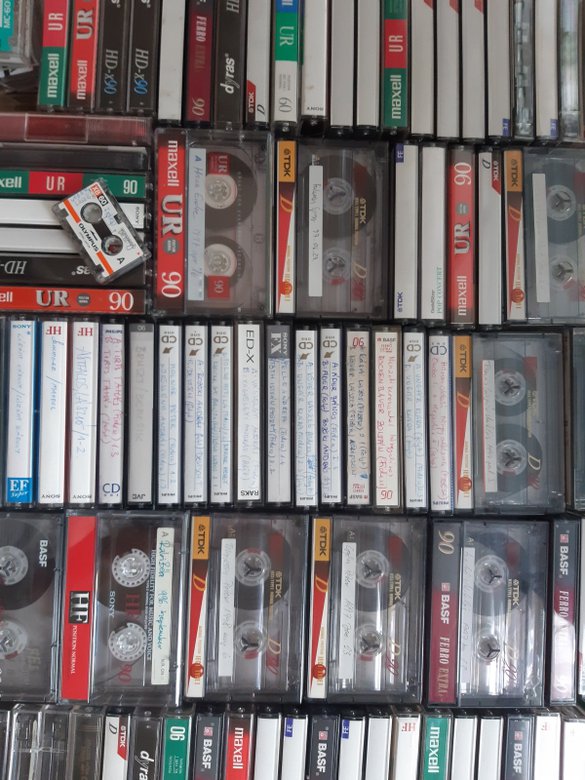
András Bozóki Collection - Interviews on the Hungarian Regime Change and Samizdat Literature
András Bozóki is a Hungarian political scientist, sociologist, and university professor at CEU. His research interests include democratic transformations, political systems, Central European politics, and political ideologies. The interviews donated by András Bozóki were conducted as a part of a research project carried out in 1997. The series includes almost 200 audio interviews conducted by András Bozóki and his team with participants of the Hungarian regime change, many of whom are still active in politics. The interviews give a comprehensive overview of the transition period in Hungary, with a special emphasis on the National Round Table negotiations. The results of the project were published in Gördülő rendszerváltás [Rolling Transition] by András Bozóki in 2019. The transfer also contains Hungarian samizdat journals, mostly Beszélő and Demokrata.
Records of Collegium Budapest - Institute for Advanced Study
From the autumn of 1992 to September 2011, Collegium Budapest was an international institution set up for postgraduate, doctoral, and postdoctoral studies. In 2011, following a series of unsuccessful negotiations with the Orbán government, the institution was closed. During the years when it operated, representatives of any discipline, from any country in the world, could be invited to the college for a full academic year. In a short time, the institution became one of the centers of Hungarian scholarly life. During its existence, 20-30 scholars per year received bursaries from the institution; altogether over 400 scholarships were awarded. The majority of the materials accumulated during the operation of Collegium Budapest were transferred to Blinken OSA's storage in 2019, the new accrual was placed at the archives in 2020 by Gábor Klaniczay, former Director of the institute. The collection includes materials related to projects and conferences, the building and guesthouse of Collegium Budapest, and also photos.
István György Tóth Personal Papers
István György Tóth (1956-2005) was a professor of history at the Central European University. Among the great eras of history, his interest was directed towards the centuries of the Early Modern Age. His accumulated documents were processed and made available for research over a decade ago, and in 2020, a new addition further enriched this collection. The accrual contains manuscripts, materials related to his dissertation, research notes and copies of archival documents, scholarly articles, course readers, theses that he supervised, and materials on CEU related academic issues, as well as a couple of microfilms and a box of electronic files on 3.5' floppy disks and CDs.
Gertrud Bortstieber Personal Papers
Economist and translator Gertrud Bortstieber (1882-1963), the second wife of philosopher György Lukács, was one of the first Hungarian female mathematicians. The Archives acquired 18 boxes of her correspondence and manuscripts in 2019. In 2020 the collection was further expanded with original copies of Gertrud Bortstieber's personal correspondence, donated by her grandson, István Jánossy. The letters in this part of the collection have been digitized and shared with the archives. The collection consists of letters written between 1918 and 1959, to a friend of Gertrud Bortstieber, also to relatives in Wien, Bortstieber's son, and other members of her family.
László Mester Collection
László Mester was mayor of Budapest’s 18th District, Pestszentlőrinc and Pestszentimre, between 1994 and 2010, and a Hungarian Socialist Party member of the Hungarian Parliament between 2002 and 2010. He began his political career in the Hungarian Communist Youth Organization and joined the Hungarian Socialist Workers' Party in 1975. In 1989 he was a founding member of the Hungarian Socialist Party. After his retirement, he recorded a series of biographical interviews in which he gave an account of his decades in politics. The collection of audio recordings of interviews conducted by Endre Domaniczky with László Mester has been donated to the archives. The entire series of interviews lasts more than 19 hours.
Ádám Modor Collection
Blinken OSA received the personal papers of Ádám Modor (1958–2009), publisher, head of the Katalizátor publishing house, further enriching the Archives’ collections presenting the activity of the Hungarian democratic opposition. Ádám Modor worked primarily as a samizdat editor and distributor, briefly contributed to Beszélő as a printer, and assisted the Áramlat publishing house as an editor. His attempt to explore the history of the democratic opposition and samizdat resulted in various publications; among them, his monograph on the early years of the Fidesz party, titled Ellenségből ellenzék (From opponent to opposition), a book he edited about Tibor Pákh, and one he wrote on György Krassó. The collection that Blinken OSA received includes sources covering most of Ádám Modor’s public activities from his samizdat years to the film interviews with democratic opposition activists.
Gábor Miklós Collection
Journalist Gábor Miklós, former Warsaw correspondent for the daily Népszabadság donated his manuscripts of articles written between 1982-1985. The collection focuses mainly on Polish domestic matters, also during the period of Martial Law, and includes internal reports for the editorial board of Népszabadság.
François Fejtő Papers
François Fejtő, (Ferenc Fejtő, 1909-2008) was a Hungarian-born journalist and political scientist, and a friend of László Rajk, whom Fejtő knew from his university years in Budapest and from the illegal communist movement since the late 1920s. Fejtő, an émigré in Paris since 1938, wrote several denunciatory articles when Rajk was arrested, tried, and executed for treason in 1949. The single item in the fonds is a digital text file, which is the scanned version of a manuscript by Francois Fejtő on the László Rajk sh
LIBRARY
We are always delighted when—besides the regular purchase of relevant professional literature—our collection is enriched with special new donations. However, it saddens us to have to report that we had to transfer a part of the press collection of the Institute of Political History, Budapest—recently thrown out of its premises—to the Library, in order to avoid forced shredding. We received a remarkable selection of 20th-century left-wing, Social Democratic journals published in Western Europe; also, newspapers from Vienna, Paris, Zurich, Berlin, and Madrid as well as the press monitor of the German trade unions from the 1920s.
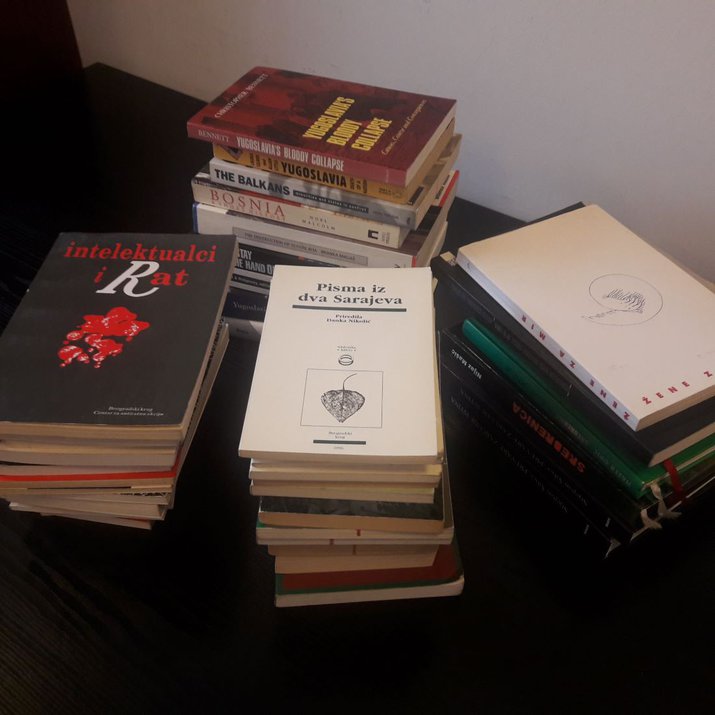
We will serve as the official deposit library of the prestigious Hungarian journal of literature and social sciences “2000” (ketezer.hu) as we received the full set of printed issues from its foundation in April 1989 together with some documents and correspondence.
Besides the institutional donations, private individuals also turn to the Library with offers. Elissa Helms and Michael Szporluk donated important books and periodicals, expanding our Yugoslav collection: sociological studies of interethnic relations, publications from the Serbian antiwar movement, Bosnian language magazines, and publications on the history of Bosnia.
A collection of memoirs of the Russian aristocracy published in pre-revolutionary periodicals was donated by Alfred Rieber; we also received microfilm copies of his Katkov archive as well as additional microfilms from Russian archives together with personal notes and papers.
Our Hungarian collection was also enlarged: new additions to the Kálmán Endre book collection arrived, we received the official Metropolitan Gazettes printed in the 1940s from István Sebő, a set of rare Stalinist publications from Károly Tóth, and newspapers issued in the fall of 1956 from Eszter Rádai.
The School of Public Policy donated more than 300 relevant English language monographs that were processed and are available through our catalog, while we also received books from the History Department, the Philosophy Department, and the Department of Political Science at CEU. CEU professors Ferenc Huoranszki, Alexey Miller, Marsha Siefert, and Balázs Trencsényi offered monographs covering mainly Cold War-related issues.
We proudly announce that—continuing our old tradition—OSA Library donated a special collection, this time to a Transylvanian library: the last transport of the OSF books comprising the reference collection of the Education Support Program took place in July to the newly established library of the National Hungarian Educational Center (Országos Magyar Továbbképző Központ) in Oradea.
The cataloging of Hungarian Numbered Books, a collection of closed-distribution inner-party publications, was completed; while the books of the Hungarian sociologist of religion, Zsuzsa Horváth are being processed.
The Library sub-page was reorganized and completed with new content.
AV PROJECTS
Despite the Covid situation, the Audio-Visual Team at Blinken OSA made good progress. The colleagues adapted smoothly to the new working environment, alternating on-site and home office work to minimize sharing the office. Preservation, digitization , and processing on a mass scale were made possible through the purchase of new equipment, preceded by very thorough research to identify the best price/quality ratio products. Most new equipment serves the digitization of photos and photo negatives – the latest major acquisitions of OSA amounting to tens of thousands of frames. Apart from preservation purposes, the massive digitization projects have made a major contribution to Blinken OSA’s ability to serve the growing number of remote research requests, due to the pandemic. Furthermore, by preparing material for the OSA Youtube channel, the AV team made considerable efforts to increase OSA’s public visibility. The members of the AV team are: Judit Hegedűs, Judit Krausz, Erzsébet Szöllősy, Dariusz Krolikowski, Kálmán Tarr, Gergely Jakab, Lenke Szilágyi and Zsuzsanna Zádori.
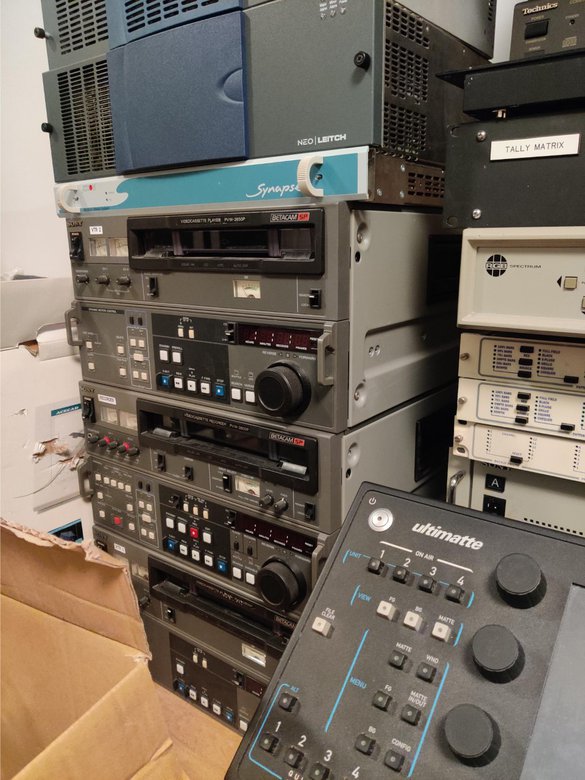
DIGITIZATION OF VIDEO, SOUND, AND PHOTO COLLECTIONS
The following collections were digitized and their digital master files quality control was performed:
- The digitization of the Film Library holdings involved making ISO (preservation master) and mp4 (browsing) copies of 4524 DVD-ROM and Blu-ray films. Films on VHS cassettes as well as born-digital films will be preserved and made accessible in a separate project.
- 146 DVDs within the video collection: HU OSA 305-0-3 Black Box Foundation Unedited Video Material were digitized into ISO files for long term archival preservation. (The full and detailed cataloging of the series was completed in 2016 and 2017.)
- 25 VHS/S-VHS cassettes of HU OSA 344-0-1 Films of the Workers’ Militia
- 61 VHS cassettes of HU OSA 378-0-1: Iraq monitoring
- U-Matic/Beta SP of HU OSA 366-0-1 Hungarian Propaganda and Tourism Agency Film Collection (in progress)
- BetaSP/ VHS cassettes of HU OSA 350-1-1 Records of the International Monitor Institute Europe (Balkan Archive). In progress.
- 40 BetaSP cassettes of HU OSA 350-2-2 Records of the International Monitor Institute Asia (Cambodia).
- 72 BetaSP cassettes of HU-OSA-350-3-1 és 350-3-2 Records of the International Monitor Institute Africa (Rwanda & Sierra Leone).
- 6 BetaSP cassettes of HU-OSA-350-4-1 Records of the International Monitor Institute Middle-East (Afghanistan).
- 9 BetaSP cassettes of HU-OSA-350-4-2 Records of the International Monitor Institute Middle-East (Iran). In progress.
- 160 VHS/S-VHS cassettes of HU OSA 13-3-1 Records of the Soros Foundation–Hungary: Publications: Film, Video. In progress.
- 35 VHS cassettes in HU OSA 304-0-16 Records of the International Human Rights Law Institute Relating to the Conflict in the Former Yugoslavia
- HU OSA 309-0-2 Monitoring of Television from Bosnia and Herzegovina (in progress)
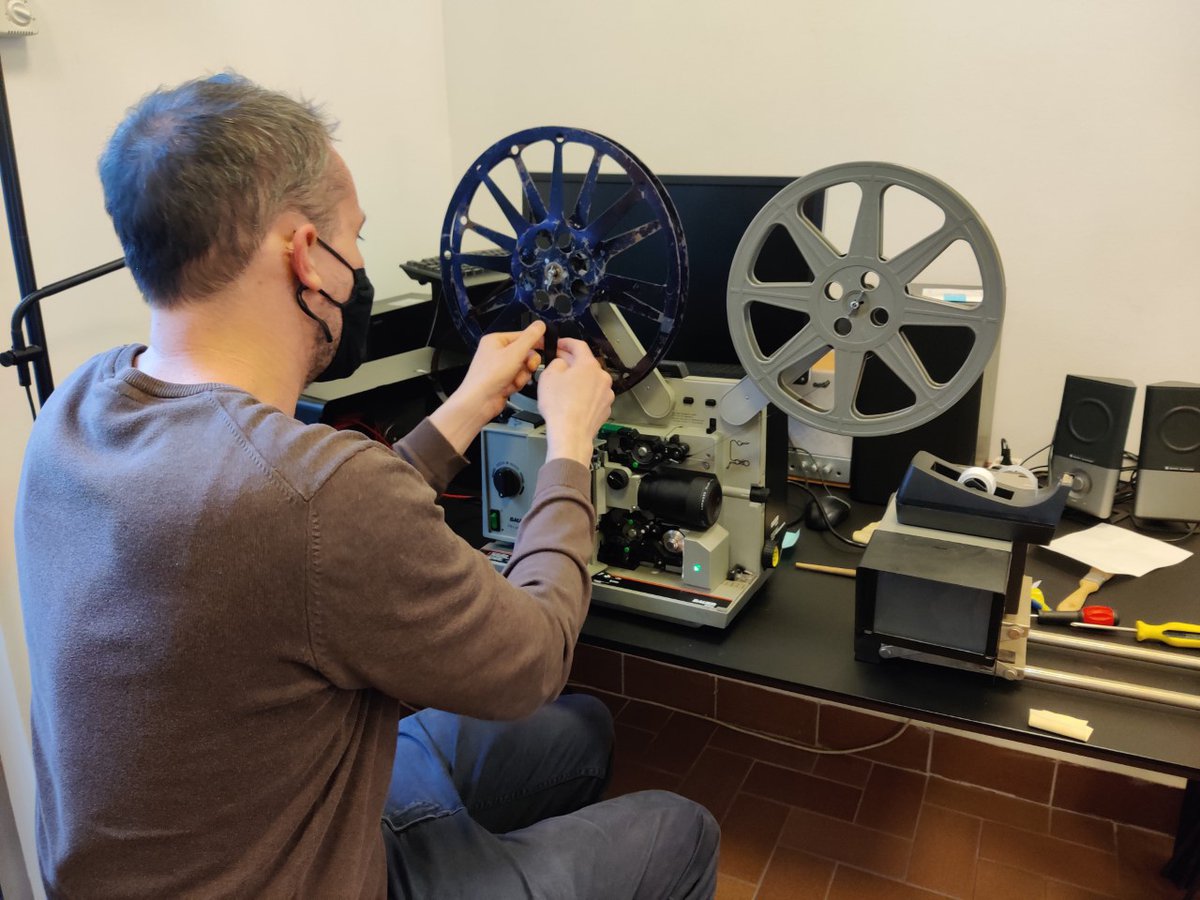
- 126 Audio cassettes of HU OSA 203-13-1 Interview with Writers and History of Communism in Central and Eastern Europe, (audio)
- 122 Audio cassettes of HU OSA 445 András Bozóki Collection (audio). The recordings are interviews with politicians who played active roles in the Hungarian change of regime in 1989. Following the digitization, the contents of the interviews will be cataloged and published on OSA’s website.
- Digitization of over 10 thousand frames of photo negatives. One of the largest private photo archives documenting the 1989-1990 regime change in Hungary, a photo archive of Éva Kapitány’s work was brought to OSA for preservation and access.
Over 10 thousand photo negative frames were selected, pre-processed, and digitized. The future fonds is HU OSA 440 Éva Kapitány Photo Collection. - About 30 audio and About video cassettes from various series were digitized at the request of researchers.
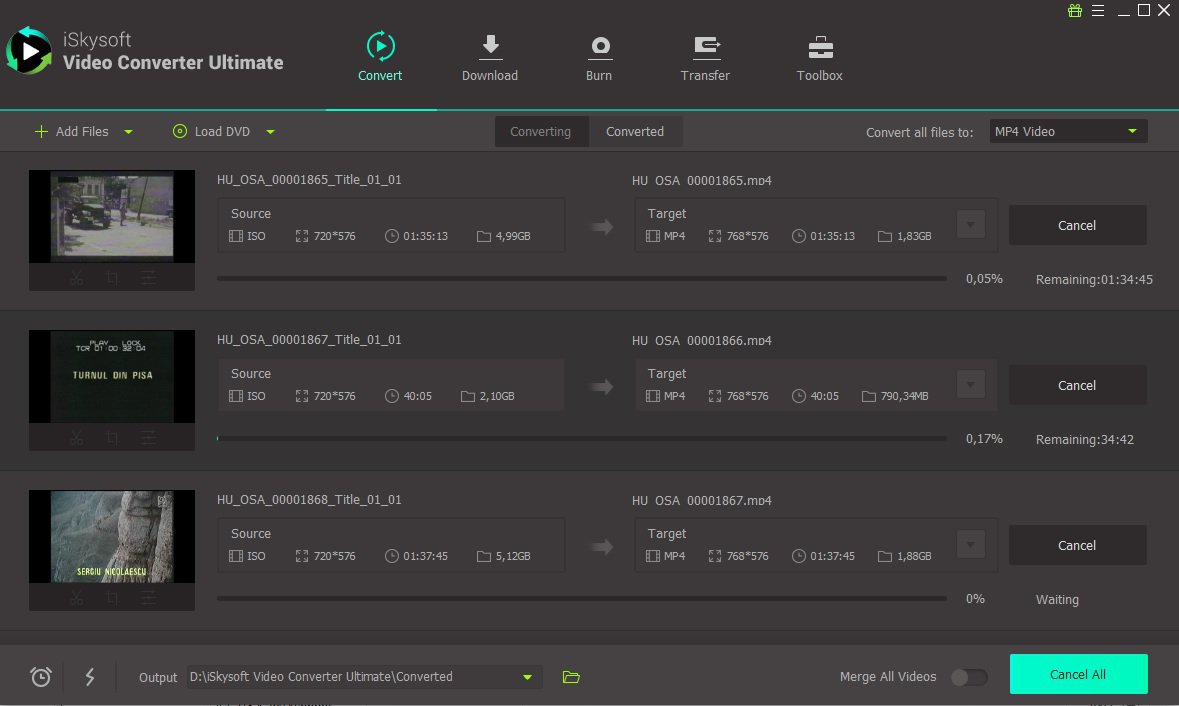
PROCESSING, CATALOGING
During the lockdown, OSA’s AV team has enhanced its cataloging efforts. Video, audio, photo, and paper collections were processed, and the metadata was entered into OSA’s Asset Management System (AMS) or into transitional “production databases”. The assets from these production databases will be mapped and transferred into AMS in the catalogue year 2021. The following collections were processed and described:
The c. 120 hours of video recordings in the series HU OSA 305-0-5 Recordings of the Opposition Roundtable Negotiations in Hungary, 1989 have been processed in OSA’s Archival Management System. As a result, a Finding Aids, containing all the names of the participants, and the issues discussed during these negotiations with historical relevance and importance is now accessible for the general public.
Over 10 thousand photos of the HU OSA 440 Éva Kapitány Photo Collection were catalogued. Each photo was described and geo-tagged, thus creating one of the largest Hungarian regime change photo archives. Editing and proofreading the Hungarian Language metadata of the first 7500 items were completed. This makes the Catalog ready for publishing in the year 2021.
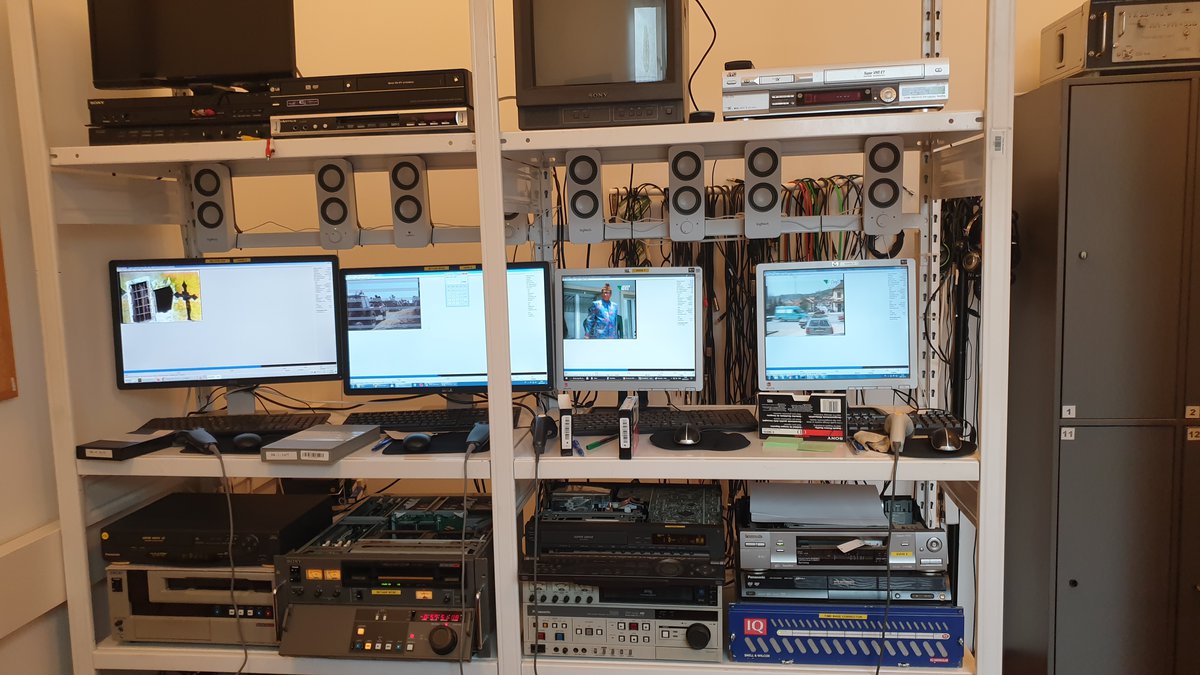
As part of the processing of HU OSA 369 Records of the Roma Sajtóközpont Egyesület: Research Unit: Sociological Survey Interviews Related to the Roma in Hungary 1971 research,
187 survey questionnaires were cataloged. These textual records constitute a rich archival primary source for those interested in the living and working conditions of Roma in Hungary under the Kadar regime.
Over 250 digitized photographs of Radio Liberty Public Affairs Photographic Files, in boxes 1 and 6 were cataloged. The entries are published in the series: HU OSA 300-1-8.
Translation into English and editing descriptive metadata of over 1000 video items of HU OSA 305-0-7 Monitoring of the Hungarian Television by Black Box is nearing completion.
The soundtracks of items in the video collection HU OSA 305-0-7 Black Box Foundation Monitoring of the Hungarian Television were checked to identify items with low sound quality. The mono and stereo video recordings were listed, and the information entered into the Findings Aids of the series.
HU OSA 305-0-6 Roma Media School Films, including about 150 films on 53 Beta SP cassettes, were cataloged with detailed annotations.
Scripting 204 military history films for future editing and cataloging. This way OSA will be able to publish yet another important collection of Hungarian communist propaganda films.
Enriching metadata in HU OSA 419 Júlia Vajda Totalitarianism and Holocaust Interview Collection. In progress
Preparing/cleaning series for upload to Research Cloud. In progress.
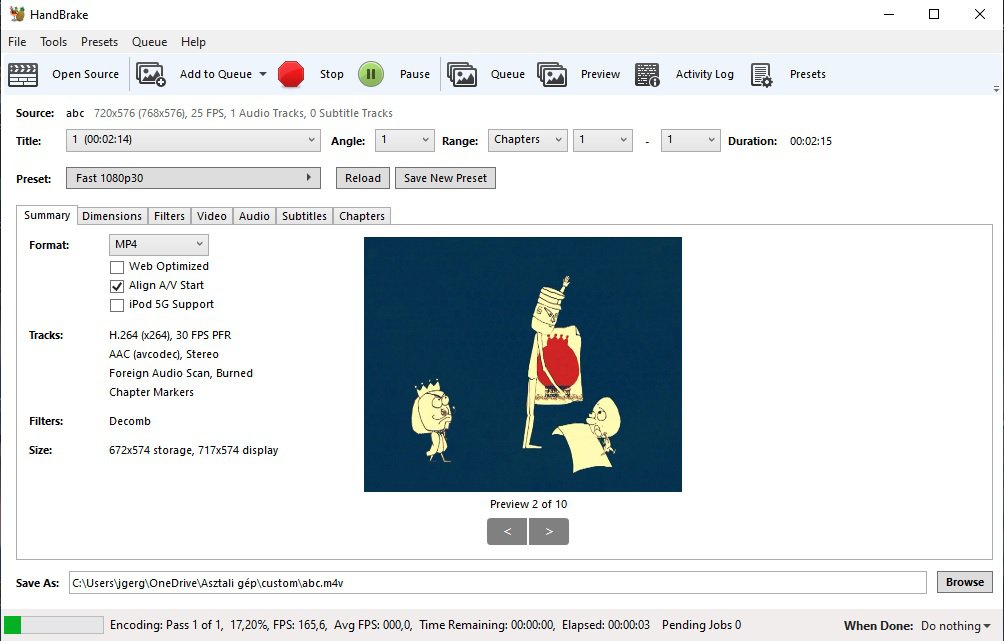
VIDEO PRODUCTION
Before and during the lockdown several film productions were completed:
Shooting video, editing the footage, providing descriptive metadata, and uploading the final product to OSA’s Youtube channel. The videos are interviews with researchers in the “Why OSA? Research in the archives” series.
Filming, editing the video footage, doing post-production work on and uploading to OSA Youtube channel recordings of public events, such as conferences, book launches, exhibition openings recorded at OSA over several years, including
Blitz Conference on the future of the Royal Palace
Book launch of the biographical interview with László Rajk
Exhibition in memory of László Rajk
Opening of Faith - Trust - Secrecy: Religion through the lenses of the secret police exhibition
Shooting video for Donald Blinken’s birthday
The shooting of the film Everything on the Goldberger House – virtual house tour with Iván Székely
Shooting opening of the Night of the Museums by Endre Kukorelly
Sound editing and video post production of RIA, RIA, MEMÓRIA - CEU - Bibó István Free
Post-production of Jamming Station film with András Simongáti
Contribution to Verzio International Human Rights Festival.
Participating in the exhibition From Harvest to Harvest with preparing AV material.
EDUCATION
Participating in the development of OSA educational material
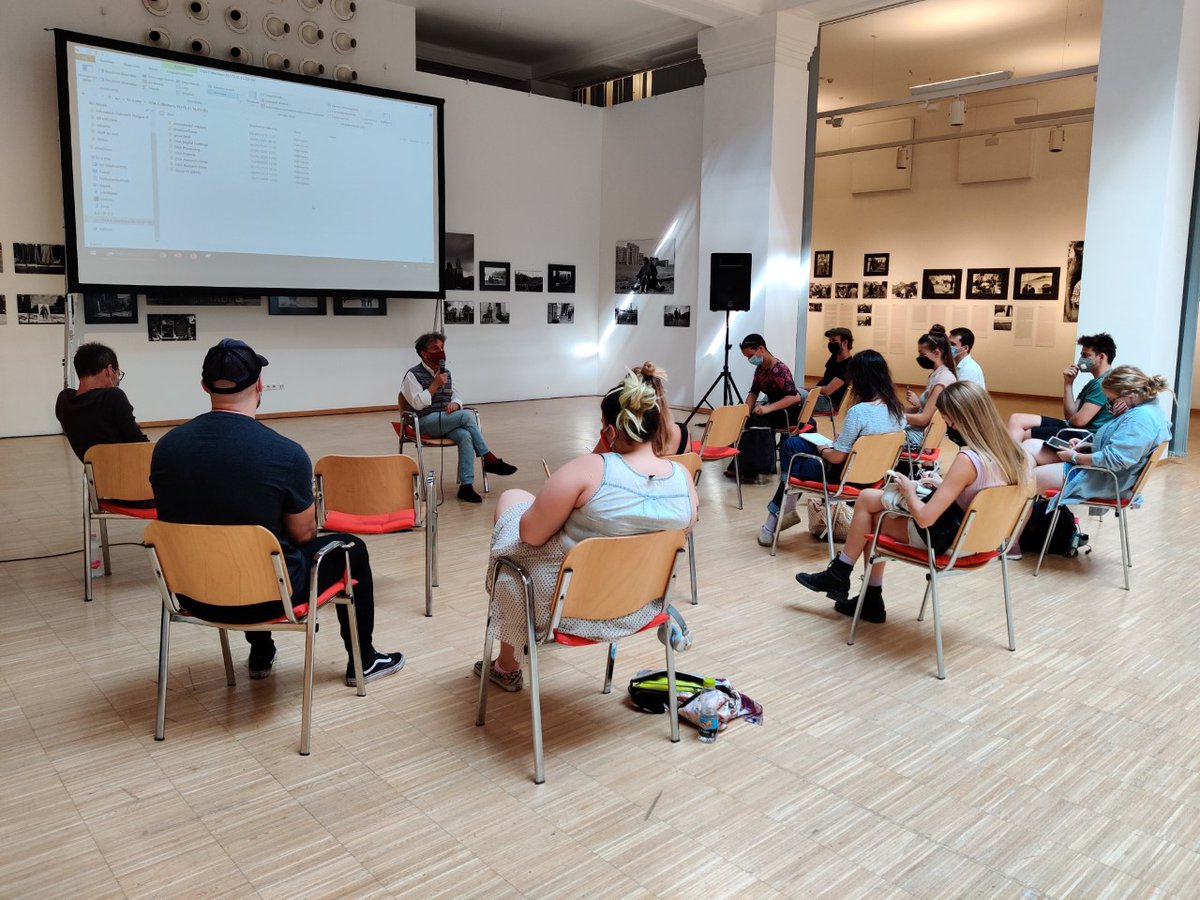
Within the framework of a joint course with the Moholy-Nagy University of Art and Design, colleagues in the AV team hosted a group of Media Design MA students. After examining and discussing with the help of OSA staff the importance of archives in shaping historical consciousness and its role in contemporary art and culture, the students were required to develop their own independent projects based on the audiovisual collections of Blinken OSA, by remixing and creatively re-using the available materials.
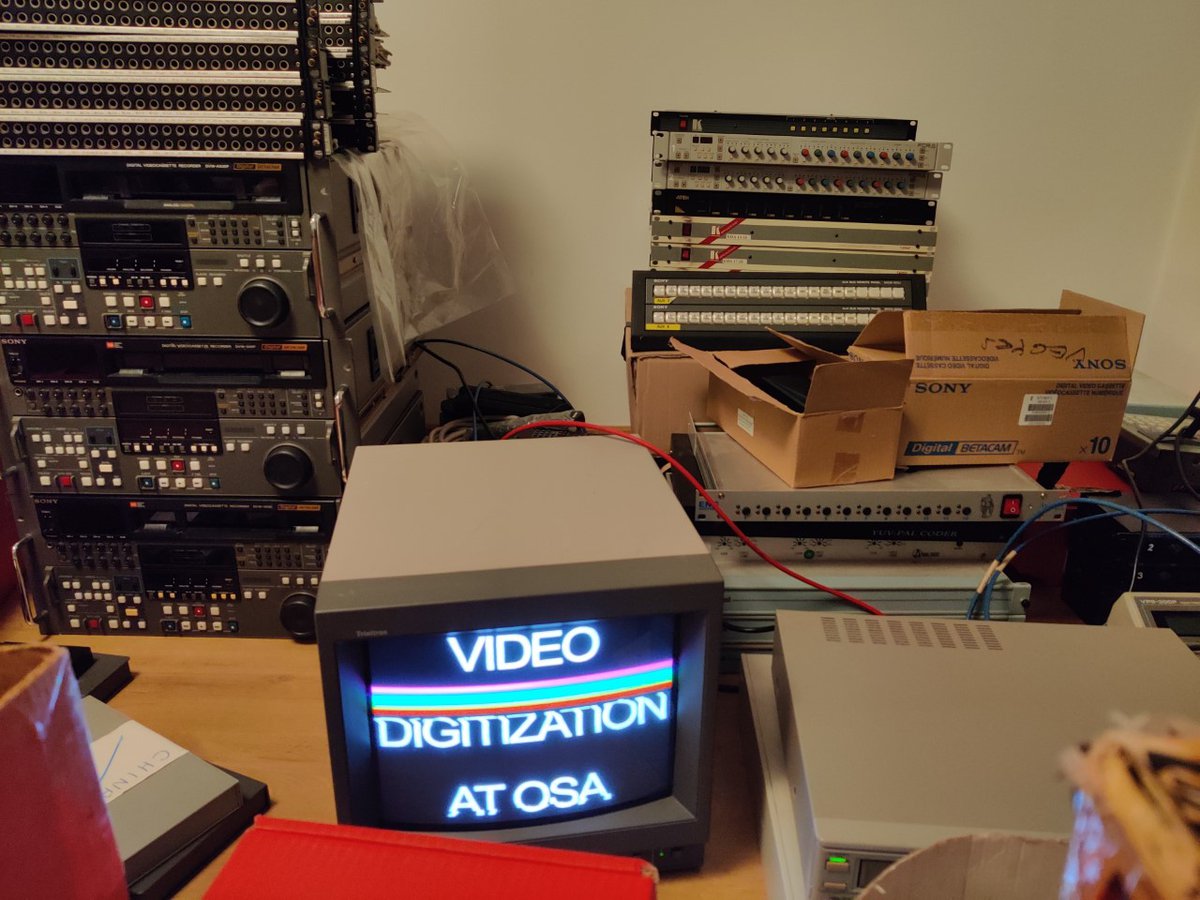
RESEARCH AND PURCHASE OF EQUIPMENT
The AV team made considerable efforts to research the field of equipment for digitizing photos and photo negatives. To enhance the capability to digitize 16 mm film, U-Matic, and Beta SP NTSC videos, OSA has purchased appropriate film and video players.
Video, sound, and lighting equipment was also procured to upgrade OSA’s video production. The most important pieces of equipment are the 4k capable camera, the professional tripod, and gimbal, also the essential sound and lighting equipment, among others.
A total of almost HUF 2.4 million HUF was spent.
RECORDS AND INFORMATION MANAGEMENT
The Vera and Donald Blinken Open Society Archives’ (Blinken OSA) Records and Information Management Services (RIM)were established to preserve the institutional memory and history of the Open Society Foundations (OSF) network and to provide record-keeping consultancy services to the Foundations’ institutions. The Blinken OSA RIM team thus serves OSF hub offices throughout Europe, including the national foundations, while also providing archival and records management services to the Central European University's (CEU) offices and departments. Of the OSF hub offices, Blinken OSA’s RIM team focused primarily on managing the Open Society Institute–Budapest office’s (OSI-Budapest) records until that office was forced out of Hungary.
For years, the strategy of RIM Services’ was to become involved in the creation phase of the records’ life cycle. However, especially in the case of the national foundations, scattered across several countries, its work gradually shifted to rescue operations, risk management, and the performance of preservation activities. The reason for this is that Blinken OSA’s RIM team is understaffed. In addition, the global network with its geographically dispersed foundations and offices constitutes a real challenge for the team.
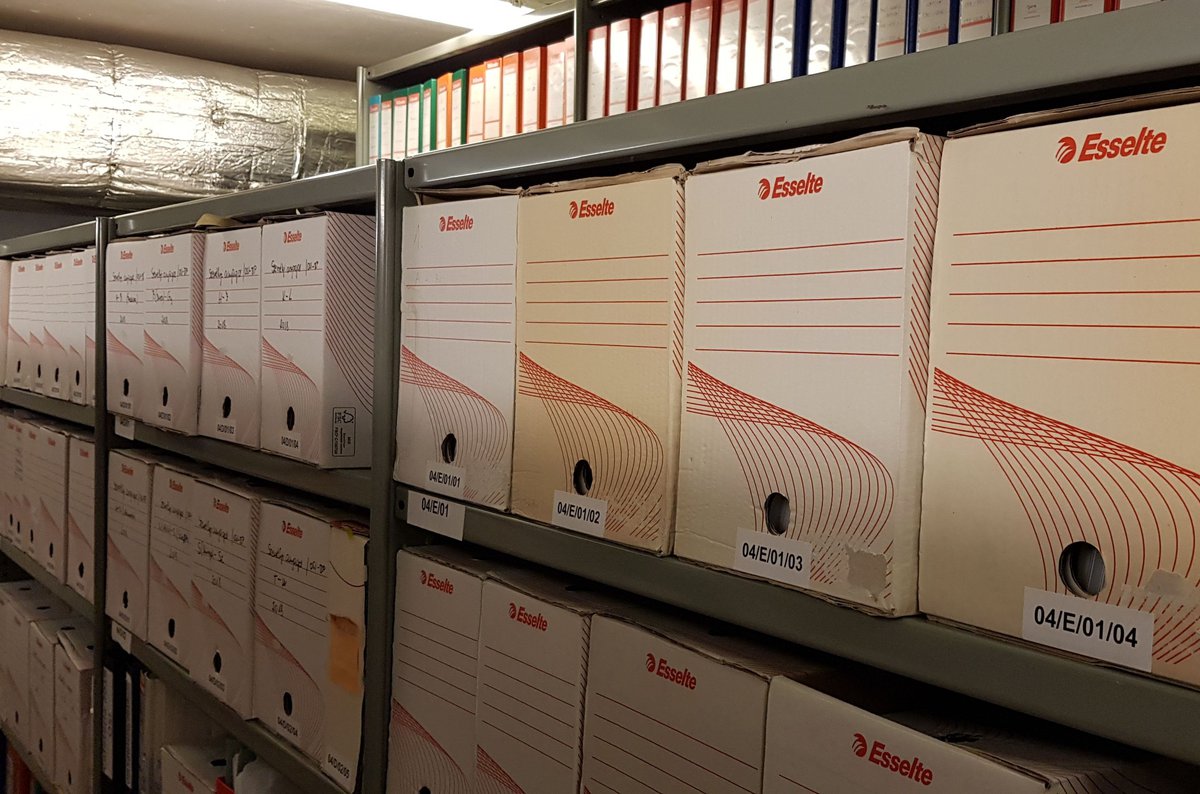
In 2020, the RIM team maintained three on-site records centers and one off-site storage facility. Throughout the year, 1665 containers (boxes/binders) of paper-based records were transferred from CEU programs/departments/offices to the on-site records centers, and 252 containers/files were retrieved in paper or electronic format by OSF and CEU staff members (174 documents were digitized for retrieval purposes). As a regular RIM procedure, 492 containers of records were destroyed after their retention period expired and dozens of containers of permanent paper records and several hundreds of electronic files were transferred to Blinken OSA for long-term preservation. Blinken OSA's RIM team assists the OSF network and CEU in record-keeping and in the preservation of electronic records as well.
2020 was a difficult and a very sad year in the history of the University. Due to "Lex-CEU", Hungary’s amended higher education law, CEU was forced to leave the country and moved from Budapest to Vienna. From the records management point of view, the relocation was not only challenging because of the huge amount of documents that had to be arranged and prepared for archiving, but also because the intensive work had to be carried out during the COVID-19 pandemic. Due to the nature of RIM-related tasks, the work required physical presence from both sides, that is, colleagues of the CEU units and the Blinken OSA RIM team.
In connection to the relocation, the RIM team conducted 149 online and onsite meetings and consultation sessions in various CEU units in 2020. These discussions helped to identify records created, received, and maintained by the different administrative and academic units. On the basis of the information acquired, the RIM team was able to provide CEU colleagues with unit-tailored advice on arranging and preparing their records for archiving.
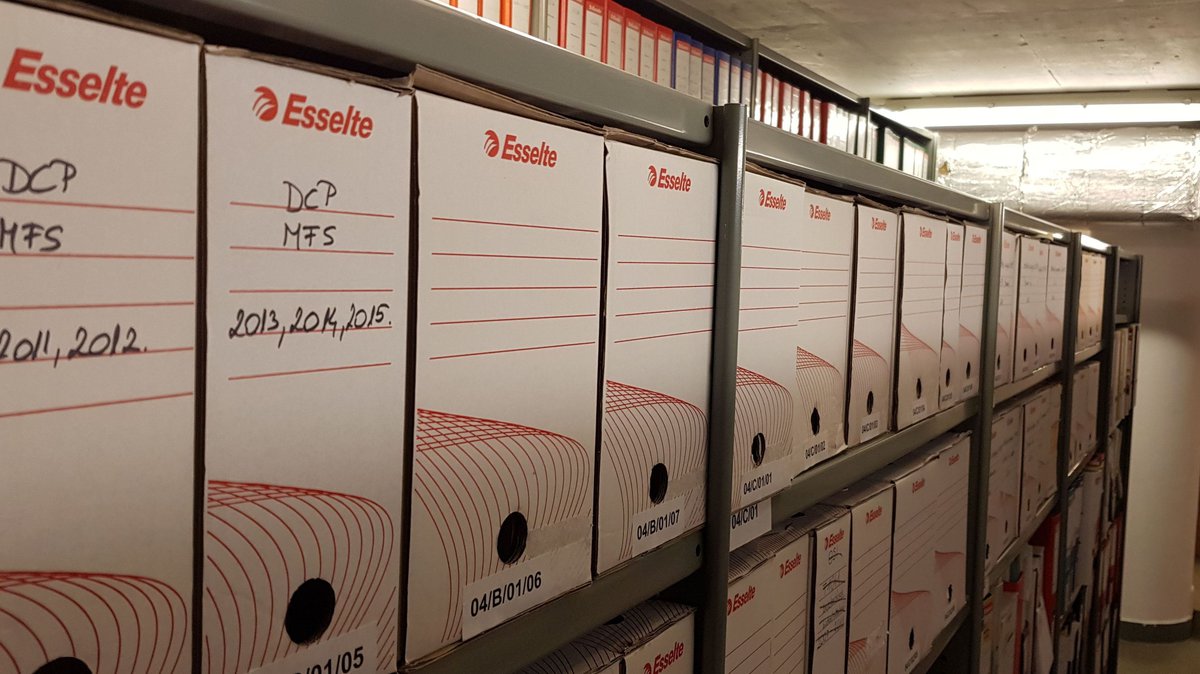
As a result of the preparatory work, 1665 containers (boxes/binders) of records were transferred to the CEU Records Center facilities, and 125 archival boxes of CEU/OSF publications and PR-related materials were transferred to Blinken OSA. In addition, 9375 files/15.9 GB electronic records were secured in Blinken OSA for long-term preservation. During the document selection and weeding phase, 39 large 240-liter security containers were filled with documents containing sensitive data. Their content–in total approx. 4 tons–has been safely destroyed. In addition, a huge amount of paper documents was collected for recycling purposes as well. The RIM team also assisted some of the units’ closing procedures with records management and archiving, including records of various formats such as paper, electronic, and audiovisual.
As a consequence of the relocation of the university, records center areas and archival storage facilities have to be established on both the temporary and the permanent Vienna campuses. Blinken OSA’s archivists and RIM team members work closely together with the Campus Redevelopment Office (CREO) and with the Facilities Management staff on planning the new storage areas and giving advice on special archival and record storage requirements, such as temperature, humidity, safety, and fire protection requirements. In order to protect archived materials from various hazards, Blinken OSA staff aims to ensure a suitable storage environment for the coming decades.
Besides supervising interns and assistant archivists in the processing of records, as well as providing records management-related and archival consultations to affiliated organizations, the RIM team also contributes to the second and third part of the Archives and Evidentiary Practices Specialization course, the Archival Practice, and the Advanced Coursework, which are offered to CEU students.
Blinken OSA's RIM Services is also increasingly involved in the afterlife of the records it takes care of. The long-term preservation of documents of historical value produced by the OSF network and CEU is an integral part of the work of the RIM Services. Though not considered strictly records management tasks, the archival processing and digitization of CEU and OSF records of historical value are now performed by those who know these documents best: the members of the RIM Services.
REFERENCE SERVICE
At first 2020 looked like another good year for research in the Archives. Although the first news about the new and unknown virus started to circulate in the media in the second part of January, our Research Room was fully operative and busy with students and Visegrad fellows. News about the spread of the virus became more frequent day by day, while concern and insecurity started to grow. While in January the virus seemed to be something distant that would bypass Europe, in February it came closer to us. Thus February remained the last busy month in the Research Room. When Italy and Austria became "hot spots," the threat of the Covid-19 virus became real and imminent. With the arising pandemic and its consequences for health, health care systems, and economies, many governments brought in legal provisions for partial and strict lockdown, hoping the virus could be eradicated. Friday, March 13, was the last day the Research Room operated in the "old normal" way. We decided to close the Research Room fully, and the rest of the archives partially, first for one month until mid-April, then until May. In June, the epidemiologic situation improved slightly, and we introduced partial opening: first researchers could book into the Research Room by email, then an online reservation system was introduced, limiting visits to five persons at a time, and not more than a two two-hour-slot a day per individual. The months of July and August brought a modest number of researchers. Obviously, only researchers residing in Hungary could attend the Research Room. We also made individual arrangements with CEU students who (depending on the Austrian pandemic restrictions) could come from Vienna for a very limited time.
September brought the beginning of the second wave of the pandemic which again severely limited our activities. A rule of one person per office at a time was made. By the end of September, a new lockdown was introduced, extending beyond 2020, and is still in place, past February 2021. In this period, our Research Room has been closed again, with a few special arrangements for researchers who needed only a short while to finish their research.
OSA started to investigate ways to facilitate remote research right from the beginning of the first lockdown. To that end, we took several steps. First, we enriched and made our online accessible Digital Repository and Curated Collections more visible. Second, we created Research Cloud, a Microsoft Office - SharePoint platform where we can upload digital content from our archival and other materials. The Research Cloud is reserved for CEU students, faculty,, and staff. Thanks to archival and IT colleagues' efforts, during the summer OSA continued to enrich the Cloud content. Third, to be able to serve non-CEU researchers we have created a separate space in Research Cloud where we serve individual requests for digital content. Fourth, we introduced our Digitization on Demand Service, open for CEU and non-CEU people. OSA has made special efforts and human resources arrangements to meet as many digitization requests as possible, as fast as possible.
Over the months of the pandemic, more than 40 individual researchers have been served remotely. While the on-demand digitization service is very new, it appears to be popular.
- There were altogether 497 unique visits to the Research Cloud. (Total from when we started the site. 29 in the last month). There are 40 registered researchers, plus 45 request-based materials directories.
- OSA Online Catalog generated approx. 16,000 unique visits and 230,000 unique page view.
- Russia, Hungary and the USA are the three countries where we have the most visits.
- Digital Repository items were accessed 87,913 times. The average time spent on a digital repository page there: 1 minute 46 seconds.
- Curated Collection items were accessed 825 times, which is 0.78% of total visits (106,317). The average time spent here: 2 minutes and 52 seconds.
Data in Table 1 illustrate the "pandemic" 2020, with a sharp fall in figures in all categories. We were closed for almost half of the year; the number of visits fell from 1161 in 2019 to only 380 in 2020. The same applies to newly registered researchers, whose number dropped from 319 in 2019 to 137 in 2020. As already mentioned, the majority of researchers were from Hungary, with a few exceptions. The number of requests fell by almost three quarters, from 924 in 2019 to 225 in 2020. Finally, the number of served archival units fell by more than by two-thirds,, from 2937 units in 2019 to 884 in 2020, a drastic drop that illustrates how research can be influenced by external factors, in this case by the pandemic.
Although the start of 2021 is still impacted by the Covid-19 virus, we should remain optimistic and trust in science and the speedy inoculation of the population, as a result of which our lives and work, including academic research can return to normal. Once we are there we hope to welcome our Visegrad fellows, CEU students, and others who could not visit us in 2020 or in early 2021. Let us hope that we can be fully operational from September 2021 and that the pandemic will be over and the virus finally tamed.
TEACHING AND EDUCATION
Lockdowns and other emergency measures introduced in 2020 not only prevented Blinken OSA from organizing public events, or providing on-site research opportunities in significant periods of the year, but also made teaching and educational activities more difficult. Those colleagues who participated in education had to rearrange course schedules and syllabuses in order to make online teaching feasible. In addition, the outbreak of the Covid-19 pandemic coincided with the move of CEU from Budapest to Vienna, and this resulted in a double hindrance for students enrolled from various parts of the world. A significant number of students could not get to Vienna, either because of the closing of national borders, or owing to not receiving visas in time, and therefore had to participate in classes from their home countries in different time zones, or from intermediate locations.
Online teaching posed specific challenges to those colleagues who were teaching archival matters, or illustrated their presentations with on-site archival materials. Talking about something and showing scanned images is very different from introducing students to the Research Room or showing them the repositories. On top of all this, students were under increased psychological pressure, due to the new environment and the lockdown, which teaching fellows in Blinken OSA – similarly to other professors and departments in CEU – tried to take into consideration as much as they could, without compromising the quality of teaching.
The course with the longest history, Archives, Evidence and Human Rights (AEHR), hosted by the Department of Legal Studies and cross-listed to the Department of History, ran for the 19th time in 2020. Being a three-credit course, 18 contact classes were provided by the traditional team of three teaching fellows: Iván Székely, Csaba Szilágyi, and András Mink. The first six classes were taught already in the fall of 2019, for 13 students (four of whom came from legal studies, six from history, two from cultural heritage studies, and one from medieval studies) and organically continued in the winter semester of 2020. The classes included three workshops, one devoted to student presentations about the state of their individual research.
The classes and workshops were over by mid-February, before the outbreak of the pandemic; however, the individual research work of the students – which is an organic part of the course – was still being conducted. Those who successfully completed the course could apply to the Archives and Evidentiary Practices Specialization. This time five students (the maximum acceptable number) applied and were accepted: all of them were historians since they were the ones who were still residents in Budapest in spring 2020. Under Csaba Szilágyi’s leadership, several Blinken OSA colleagues participated in teaching in this specialization. The three modules of the specialization (of which the AEHR course itself was the first) included Archival Practice, and Advanced Coursework, and was concluded by a written examination. Due to government regulations and the Rector’s decisions, the greater part of the specialization had to be conducted online.
History in the Visual Mode: Methods and Practices of Documentary Story-telling was the title of the course Oksana Sarkisova was teaching together with CEU’s Media and Visual Education Specialist Jeremy Braverman in the fall semester. The course focused on the representation of contested historical events in documentary cinema, combining theoretical and practical approaches. It introduced students to the basics of analyzing and producing moving images that use historical arguments and explore the relationship between memory and public spaces. The theoretical part of the course surveyed classical and experimental documentary films and addressed mechanisms of constructing historical narratives by visual means. In the practical component of the course, students learned the basics of camera work and editing and did group exercises to develop their visual skills.
Ioana Macrea-Toma taught her seminar "Is Coronavirus China’s Chernobyl?": Historical and Public Discourse about Hidden Phenomena/Enemies also in the fall term. The seminar discussed the case study of the nuclear accident at the Chernobyl Power Plant from April 1986 and the seemingly comparable global event of the recent Covid-19 crisis. It addressed questions about the very legitimacy of making analogies between different catastrophes and about the usefulness and adequate use of historical models and methods in understanding complex issues with lethal consequences. The seminar familiarized students with catastrophic epistemology, actor-network theory, styles of reasoning, and archival ethnography.
Csaba Szilágyi was among the teaching fellows who provided a joint seminar for doctoral (SJD) students, titled Socio-Legal Research Methods, organized by the Department of Legal Studies. The seminar provided an overview of existing methods in legal and social sciences, including comparative legal analysis, quantitative methods, interviewing techniques, discourse analysis, and the archival method. Csaba’s session, “Qualitative research methods: archival research” looked at the ways and challenges of identifying, collecting, and reading (interpreting) relevant information during archival research, and at its relevance and usefulness in the thesis writing process.
András Mink provided lectures and seminars for incoming students of CEU before the 2020 lockdown. He also delivered a lecture series titled Political Ideas of the 20th Century in the autumn semester, for students of the University of Theatre and Film Arts (SZFE), Budapest, the institution whose students started a persistent protest against the takeover of their school by a new autocratic leadership. The lectures were delivered in SZFE’s building, occupied by the students for months until the building was closed down.
Kálmán Tarr of Blinken OSA’s audiovisual team, taught a course at the Moholy-Nagy University of Art and Design (MOME), together with Miklós Erhardt, János Szirtes and Krisztina Erdei, for Media Design MA students. The course focused on the importance of archives in shaping historical consciousness and its role in contemporary art and culture, involving Blinken OSA’s audiovisual collections. Students were required to develop their own independent projects based on these collections, by remixing and creatively re-using the available materials. The results of their work are publicly available in the form of an online exhibition at https://hiddenlayers.osaarchivum.org/
RESEARCH
Almost all professional and informal activities of Blinken OSA in 2020 were heavily impacted by the circumstances of the pandemic, as can be seen from the chapters of this report. The Reader might think that from the range of our activities research was impacted the least, but this is not true. Researchers do not only need access to sources but they also need an inspiring environment, good working conditions, intellectually stimulating discussions, joint coffee breaks, and the like. We were not fortunate enough to enjoy such an environment in most of 2020. Still, our colleagues produced remarkable research results even under these circumstances.
Oksana Sarkisova was on sabbatical in January-June 2020 working on the manuscript for Snapshot Histories, the first book to connect domestic photography, family memory, and the debates over the Soviet past in a way that takes into account both the material and the narrative dimension of remembering. The overarching framework of the book approaches family photographs as moving targets of both state memory politics, and of generational and individual efforts to grapple with their history.
Ioana Macrea-Toma did extensive research through the collection of Radio Free Europe's Audience and Analysis Surveys in order to propose a new methodology to deal with the knowledge produced by Cold War sociologists and pollsters. Her main concern is how to treat such observational data about Eastern Europe without endorsing either a radical deconstructivist approach that sees in them a mere political artifact or the opposite objectivist perspective which takes them for granted as real data about listenership and political opinions. This research will be part of a future book about truth-seeking in the Cold War.
István Rév’s research work in 2020 was published in the form of two book chapters: “How Hungary Won the Second World War” was published by Routledge in the book The Holocaust/Genocide Template in Eastern Europe (edited by Ljiljana Radonic) and “Accessing the past, or Should Archives Provide Open Access?” was printed by The MIT Press in the volume Reassembling Scholarly Communications, Histories, Infrastructure, and Global Politics of Open Access (edited by Martin Paul Eve and Jonathan Grey). István also worked (and is still working) on two book-length manuscripts on “Conceptual Trials” and on “The alleged secrets of children in history”.
Csaba Szilágyi prepared and submitted his Ph.D. project proposal with the title “Roles, responsibilities, and limitations of archives/archiving in postwar memory politics: the case of archiving the documentary and material heritage of the 1991-1995 wars in Bosnia and Herzegovina”. He introduced a new topic in the Archives, an Evidence and Human Rights course: Human rights archives and social in/justice. Csaba was locating and reading relevant literature, as well as processing interviews with the Yugoslavia Archive Project team archivist in preparation for a co-authored article on epistemic violence in archives of violent past(s). He also did archival consultancy: researching for and preparing a concept paper, an archival facility plan and budget (including storage and ICT needs), and a training program for project archivists for the Srebrenica-Potočari Memorial Center and Cemetery (BiH).
András Mink was mostly concerned with editing a book based on a long series of oral history interviews conducted by him and Tamás Meszerics between 2009-2015 with János Kis, philosopher, political scientist, leader of the Hungarian democratic opposition from the mid-1970s, one of the founders of the democratic republic in 1989-1990. The book was published in early 2021, under the title Szabadságra ítélve (Condemned to Liberty). Besides this work, he was the curator of the exhibition From Harvest to Harvest – the Hungarian Calvary, 1918-1920 The exhibition opened in Galeria Centralis, then was forced to move online due to the lockdown of public spaces, and this included intense research work in Blinken OSA’s holdings and other historical sources.
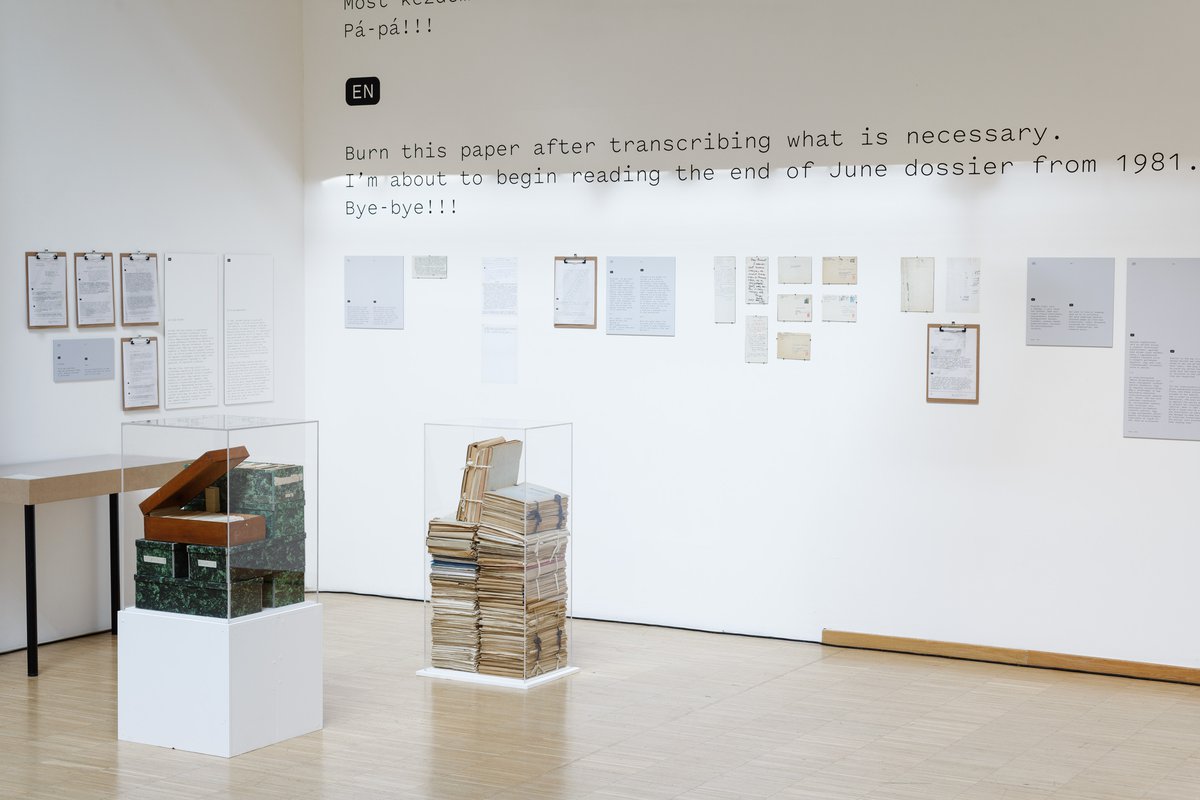
Katalin Székely did research for Blinken OSA’s online and offline public exhibitions: Faith – Trust – Secrecy: Religions through the Lenses of the Secret Police, which was organized in the framework of the international Hidden Galleriesresearch program and included documents from the newly received collection of personal papers of Zsuzsa Horváth, From Harvest to Harvest – the Hungarian Calvary, 1918-1920, together with András Mink, and two exhibitions realized in 2021 – but the respective preliminary research was conducted in 2020 –, Records Uncovered: Gay and Lesbian Histories in Central and Southeastern Europe, 1945–1999, and Order and Dreams, of which Katalin was curator, in cooperation with OFF-Biennale Budapest. In 2020 Katalin continued her ongoing research in the framework of her Ph.D. thesis written for the Media and Contemporary Culture Ph.D. Program at ELTE. She investigates the paradigm shift of conceptual art in the local (Hungarian and Central and Eastern European) context and the reception of conceptual art on different levels of art communication.
Anastasia Felcher published an article and two book chapters in 2020. Her article "Recent Public Discourses on Anti-Jewish Violence in Moldovan History, 1991–2019" was published in the journal "Holocaust and Genocide Studies", and two chapters on politics of history and memory in Moldova and de-facto state Transnistria are part of the edited volume "The Politics of Memory in Contemporary Russia and in Countries of Eastern Europe" published in Russian by the European University at St. Petersburg Press. Anastasia also worked (and is still working) on a book manuscript “Jewish Culture and Heritage in Transition" on politics of memory, preservation, and representation of Jewish past in Eastern Europe after 1989/91. She also engaged in archival research based on the OSA holdings that would reveal aspects of communicating about cultural heritage behind and beyond the Iron Curtain starting from the mid-1950s.
Iván Székely finalized his chapter “Freedom of Information: A Constitutive Public Good in Democratic Societies” for the Research Handbook on Information Policy, to be published by Edward Elgar Publishing in 2021. His illustrated article “TK 3.0 – A nyilvános archívum” [TK 3.0 – The open archives], was published in Jel-Kép, the quarterly journal of the Hungarian Communication Studies Association, in which he presented the vicissitudes of the documentation of the Mass Communication Center, later renamed as the Hungarian Institute for Public Opinion Research, which finally arrived in Blinken OSA; the considerations of its archival arrangement and description, and, in order to encourage research, provided a brief practical guide for using Blinken OSA’s online catalog. Iván continued his active participation in the editorial work of the quarterly journal Információs Társadalom (Information Society), which now publishes every second issue in English.
Blinken OSA continued its long-standing practice of organizing internal seminars where interested colleagues can discuss current research questions. In 2020, under the leadership of Ioana Macrea-Toma, the archival seminar series continued the discussion on current socio-political contexts by addressing issues related to the Cold War's legacies, from the recurrence of "totalitarianism" (as theorized by Masha Gessen in her book The Future is History, 2017), to the efficiency of the human rights paradigm (with the help of Samuel Moyn's reflections) and the related identitarian politics which shape activism nowadays. The questions an archive is interested in with regard to the changes within such paradigms and trends are whether and how a complex archival institution should change its approaches to teaching, research, cataloging, and public programming within current concerns. For example, the participants in the seminar reflected on what the balance would be between developing more comprehensive analyses with regard to non-democracies (as Samuel Moyn and Mark Lilla urge us) and preserving a profile given by the main collections that we have. What kind of vision should we have about the acquisition of new materials? Or, how could our collections serve the discussion on Masha Gessen's insights on reading and understanding Russian society through the lens of "recurrent totalitarianism”? Last but not least, one recurrent dilemma is how past cataloging categories could be calibrated to current research questions while preserving the archival vocabularies of the past.
PUBLIC PROGRAMS
Year 2020 was an exceptional year for everyone and the archives is no exception. It all started as usual in January with the closing of the Rajk Vision exhibition, a tribute to László Rajk, who had unexpectedly passed away. The exhibition was launched in December 2019 and stayed open only until the 5th of January 2020.
The event was best described by a quote from László Rajk’s friend Miklós Haraszti:
“Tall men go upward; free men go outward, from the innate to what can be learned. They face three demons of inertia: what is down below, what is inside, and what is in chaos. László Rajk the man votes (ça va, ça va); László Rajk the artist makes a choice. Always against the demons of inertia, and always for freedom.” (Miklós Haraszti)
After this exhibition closed things were going as planned; little did we know that from a huge metropolis in a far-away region of the world, a deadly pandemic would decide the fate of millions and deeply affect the professional year ahead of us.
In January we tuned into the program preparations of the Budapest100 Festival with fresh hopes of attracting volunteers for the Every building is interesting - Budapest 100, 2020 program. Launched by the Archives back in 2011 and subsequently taken over by the Hungarian Contemporary Architecture Centre but still supported by Blinken OSA, Budapest100 has become a festival celebrating both the architectural heritage and the local communities of Budapest. 2020 was a milestone in the history of the festival as the 10th edition of the festival was organized focusing on the residential communities. All former participating houses were invited to take part in the program to celebrate the anniversary. Despite the full-blown pandemic the Budapest100 Festival could take place in September, unlike previous years when the festival was set to happen around the 100th day of the year.
Film screening events are an essential part of the public program structure of Blinken OSA. As every year the Verzió film festival’s most notable films were to be re-screened in the framework of Re: Verzió. The event was held between February 20 and May 28 with free screenings of 8 of the most successful films from the 16th Verzió International Human Rights Documentary Film Festival. The screenings were followed by discussions with the filmmakers, experts, journalists, program, and human rights activists. The screenings started onsite, in the Gallery of the archives, but after two films the whole program came to a halt and the rest of the screenings had to be canceled due to the pandemic.
The Faith – Trust – Secrecy - Religion through the lenses of the secret police exhibition was due to run from February 28 to April 05, 2020. The exhibition was organized on-site like our previous exhibitions and was opened in the Galeria Centralis before the unprecedented closure of our institution due to the pandemic.
The theme of this exhibition was about the ways in which Communist totalitarian states used secret police operations to “capture” religion in images, graphics, texts, and folders in order to control and eliminate those they deemed untrustworthy. This exhibition formed part of a larger project funded by the European Research Council that explores the creativity of religious groups under totalitarian rule through the holdings of the secret police archives in four countries: Hungary, Romania, Ukraine,, and the Republic of Moldova.
March 4, 2020 was the date marking one of the last onsite events at the Galeria Centralis before the institution closed down due to the pandemic. The film screening event was part of the Religion on trial? Film and religion during Communism exhibition program.
On March 5, 2020, we hosted another film screening event entitled Bifocal freedom, organized by the Institute for Advanced Study @CEU, Blinken OSA Archives, and the Visual Studies Platform as part of the ongoing cooperation.
While the world turned upside down with the pandemic and the Institution was closed to outside visitors, colleagues turned the onsite exhibition into an online available exhibition. As such Faith – Trust – Secrecy became available online as a virtual exhibition in the spring after the Galeria Centralis closed down as well. Through 360° interior photos, scanned archival documents, and explanatory texts, visitors could still explore the complex interactions of the secret police with religious groups and those seeking to research them.
The Blinken OSA has been participating in the Night of the Museums for more than a decade. Last year the event moved online; it required quick thinking and creativity on our part to organize it. On June 16, 2020, we presented a bilingual online event with a variety of cultural programs. An interesting report was made available to the public about Hungarian archives and libraries entitled The Laborers of Culture. Data on the Situation of Public Collections.House tours, discussions, and public lectures followed and a real-time exhibition opening took place. There are no Nights of the Museums without an event at Blinken OSA, so this year the exhibition entitled POST-SOVIET – The Photos of Lenke Szilágyi 1990–2002 Virtual exhibition was opened by Endre Kukorelly. The final program of the night was a film screening.
The summer offered a chance to open up the Institution and the Galeria Centralis, so the exhibition that had gone online during the Night of Museums was now open to the public at the beginning of July 2020. The photo exhibition depicted the work of Lenke Szilágyi our colleague and respected photographer. For more than a decade, Szilágyi had regularly traveled to the (former) Soviet Union. Her photos are sensitive imprints of an era of constant change in a territory of eternal immutability. She depicted in her portraits the hope and despair of the time, while also adding her own witty commentaries in the diary entries accompanying the photos. This exhibition was the first major presentation of the collection.
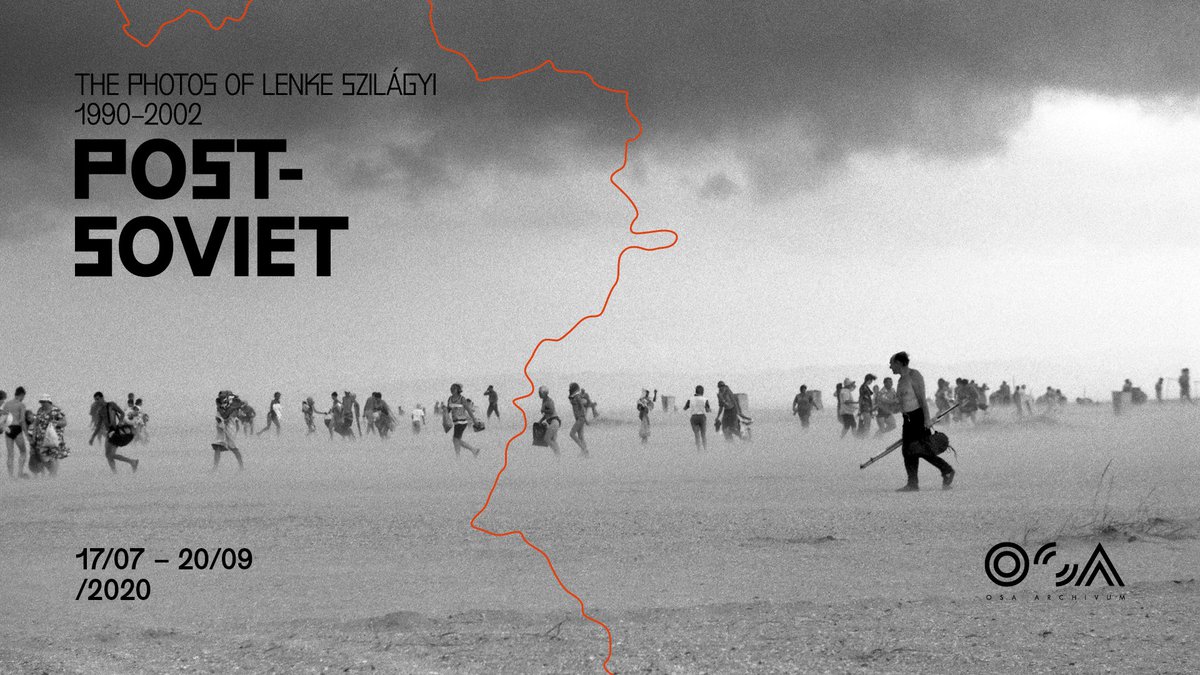
With the pandemic lingering on the Budapest100 Festival, which had been postponed to September took also place in the Goldberger House, with restricted entry to the building itself; the previously advertised programs could only be accessed online. This part of the Budapest100 program series took place on the weekend of September 19-20 at the archives.
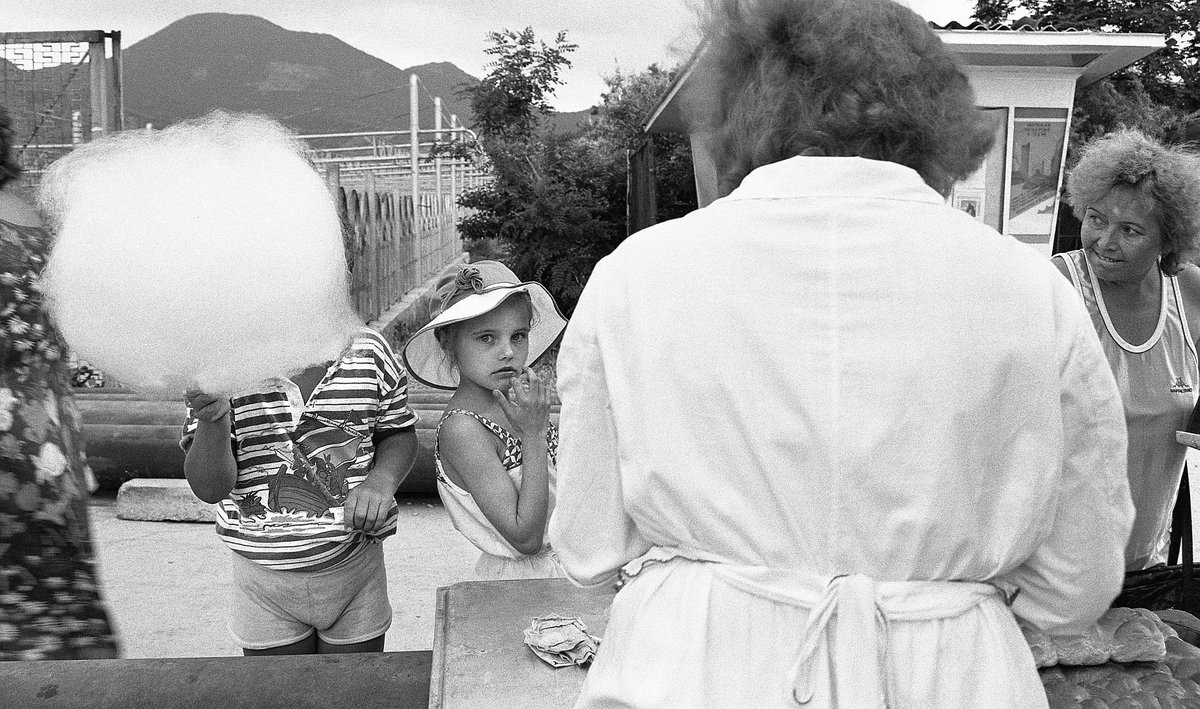
With the pandemic still raging and with another wave of restrictions the exhibition that could only be open in the summer and was closed down on September 20, 2020, moved online. As a result of the pandemic situation, long before the show opened at Blinken OSA, our dedicated colleagues had prepared an online version for the 2020 Night of the Museums. Thanks to the online format, our audience could freely (re)visit Lenke Szilágyi’s journey and read her witty and genuine diary excerpts. About the exhibition: POST-SOVIET – Photos by Lenke Szilágyi 1990–2002.
The pandemic year went on in the fall and new restrictions came, meaning that the institution was partially closed down and the Galeria Centralis could not be visited. Another exhibition was opened both onsite and virtually at the same time, under the title From Harvest to Harvest – Hungarian Calvary 1918–1919. On October 15, 2020, an online event was organized to open the exhibition.
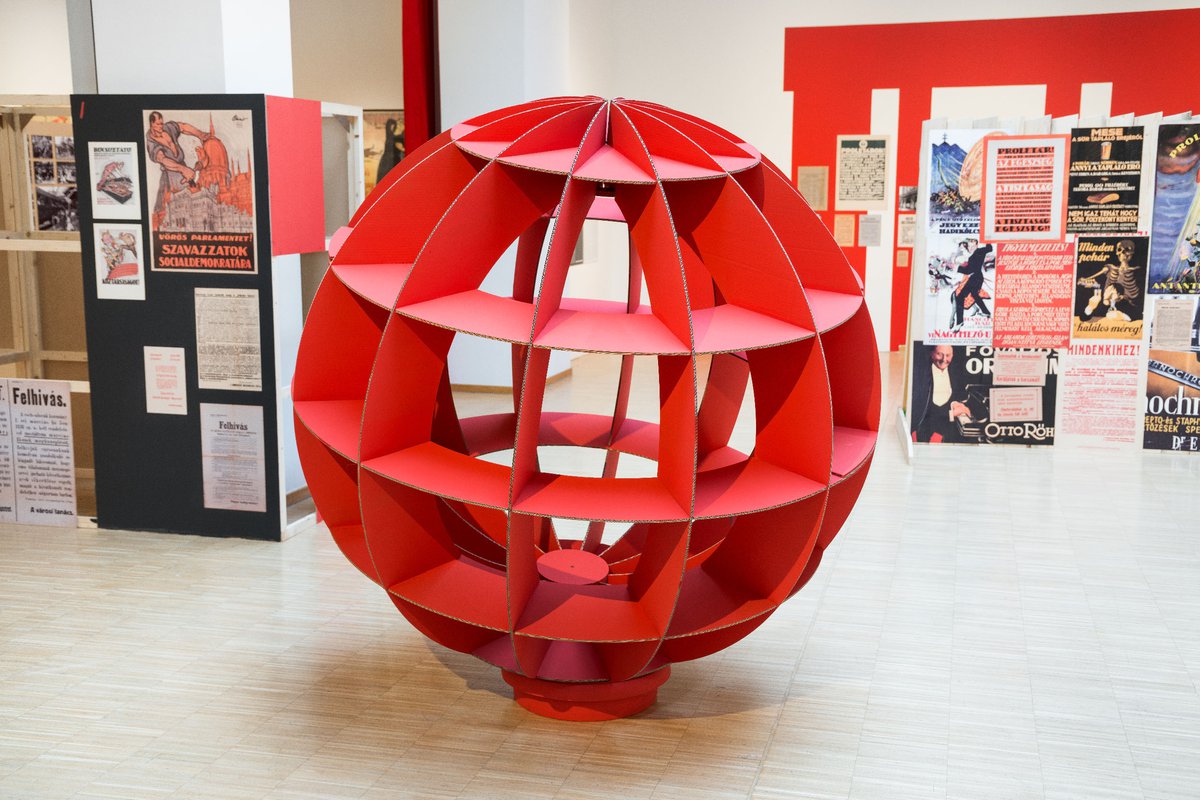
This exhibition endeavored to show the events that occurred in Hungary in 1918–1919 in their real domestic and international context. By doing so, it was intended to shed light on those still unsettled traumas of the age, which could never become mere history in Hungarian collective remembrance. The drama of 1918–1919 with its shocking twists and turns—the lost war, the dissolution of the Monarchy and the Hungarian Kingdom, the Aster Revolution, the rise and fall of the Hungarian Soviet Republic, the counter-revolution, and Admiral Horthy’s rise to power—all took place within a year. Literally, from harvest to harvest.
As the year did not allow us to organize the usual colorful palette of onsite events, another online program took place in October, a book launch organized by the Európa Publishing House and Blinken OSA. The author of the book, our former Visegrad Grantee and renowned journalist, Béla Révész presented his book István Dobi – The Forgotten Head of State and went online to discuss his book with our colleague András Mink, Historian.
One of the most successful spin-off projects of the Archives is the Verzió Human Rights Documentary Film Festival, held every November. In the year 2020, however, the festival had to look for novel ways to present the numerous documentary film entries and the rich variety of programs. Thus the 17th Verzió moved online this year and Hungary’s only human rights documentary film festival became available nationwide, between 10 and 22 November. Fifty of the most enthralling and hottest international and Hungarian human rights documentary films were available directly in the home of its audience, starting with the opening film, 76 Days, which provided an account of the early days of the COVID pandemic in Wuhan, China. The films were available for almost two weeks.
In November, Blinken OSA participated in the CEU Virtual Open House. This was the first-ever virtual CEU Open house, taking place on November 27, 2020. What made it exceptional was that anyone could join the program online. With the CEU’s move to Vienna, it was essential that we participated, show-casing our holdings and programs online.
The last notable event of the year was when the From Harvest to Harvest – Hungarian Calvary, 1918–1919 exhibition - similarly to previous exhibitions of the year - moved online in December, making it available for wider audiences.
The year of the pandemic posed enormous challenges for the Archives to continue its successful public program series without a notable break, and the year proved that with dedication and creativity those obstacles could be overcome and we could still reach out to wide audiences online.
VERZIO
Verzió, a joint project of Blinken OSA Archives and the nonprofit Verzió Film Foundation, began its activities in 2020 by presenting the program of the repeated screening series, Re:Verzió, with 8 individual events to take place between February 20 and May 28. The traditional Spring film club of Verzió was designed to show once more some of the most beloved films from the program of the latest, 16th festival edition of 2019, including the winners and audience favorites - followed by discussions with the filmmakers, experts, journalists, and human rights activists. The first two screenings took place as planned at the Blinken OSA Archive, but the rest of the program was postponed indefinitely due to the spread of the coronavirus in Hungary.
On February 20 we hosted a full-house screening of the Oscar-nominated Romanian documentary, the opening film of 16th Verzió, Collective (d. Alexander Nanau, 2019, 109 min). The screening was followed by an exciting panel discussion with guests Márton Asbóth, Head of the Privacy Project at the Hungarian Civil Liberties Union (TASZ) and coordinator of the campaign against hospital infections, and Gabriella Lantos, renowned health care manager. The discussion focused on the responsibility of the chain of authorities in hospital management and ideas about how to reform the failing health care system in Hungary. At this point, we had no idea how urgent the topic would be in just a few weeks from then.
Read the review of the event at the OSA Blog.
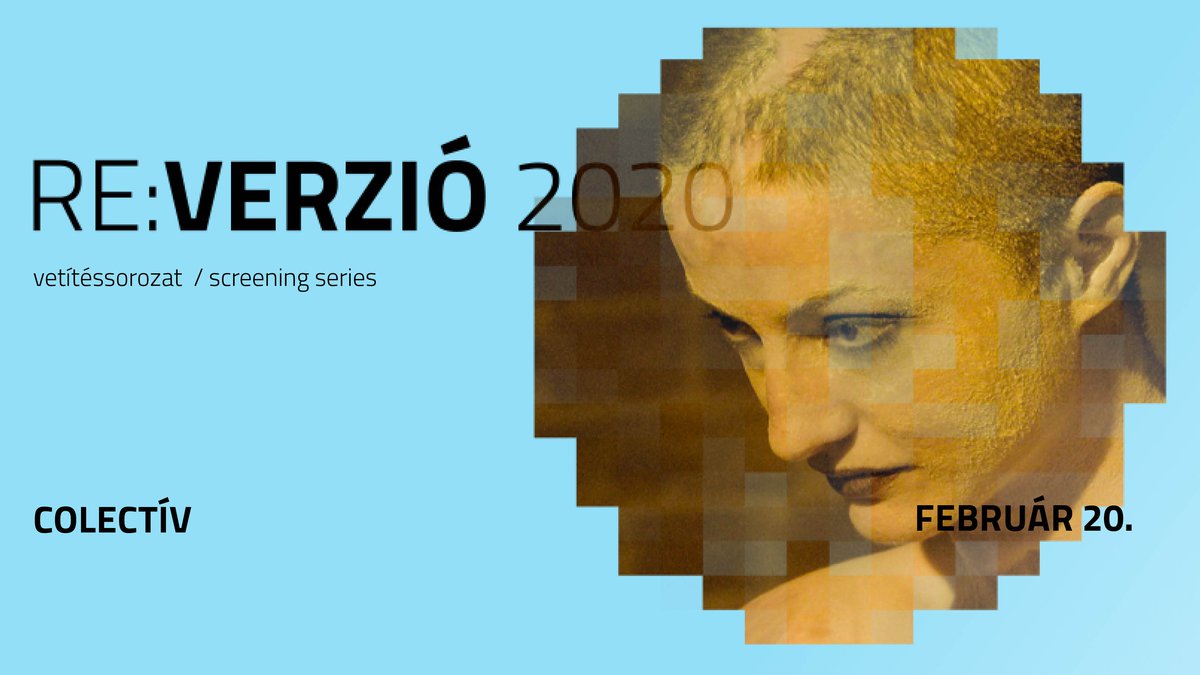
The second screening took place on March 5, 2020, with the winner of the Audience Award, The Euphoria of Being (d. Réka Szabó, Hungary, 2019, 83 min). Our guests were Éva Fahidi and Emese Cuhorka, the main protagonists of the film. It was once in a lifetime experience for all attendees, to have the opportunity to talk to one of the last living Holocaust survivors who turned their pain and loss into art, making their memories last forever.
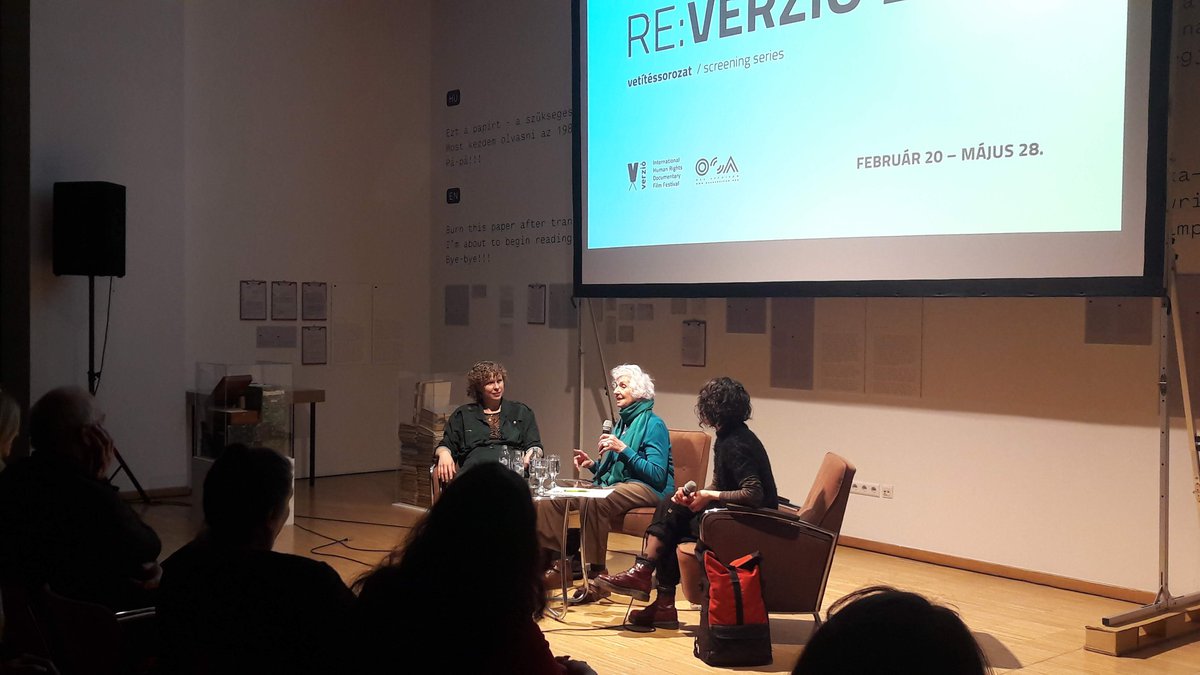
Realizing that the pandemic was not going to be over for quite some time while preparing for the upcoming, 17th Verzió Film Festival, we hosted two online screenings in June: The Wait (d. Emil Langballe, Denmark, 2016, 58 min) in cooperation with Menedék Association, and DANGEROUS ACTS: starring the Unstable Elements of Belarus (d. Madeleine Sackler, Belarus, 2013, 76 min) as part of the program series at the night of the Museums.
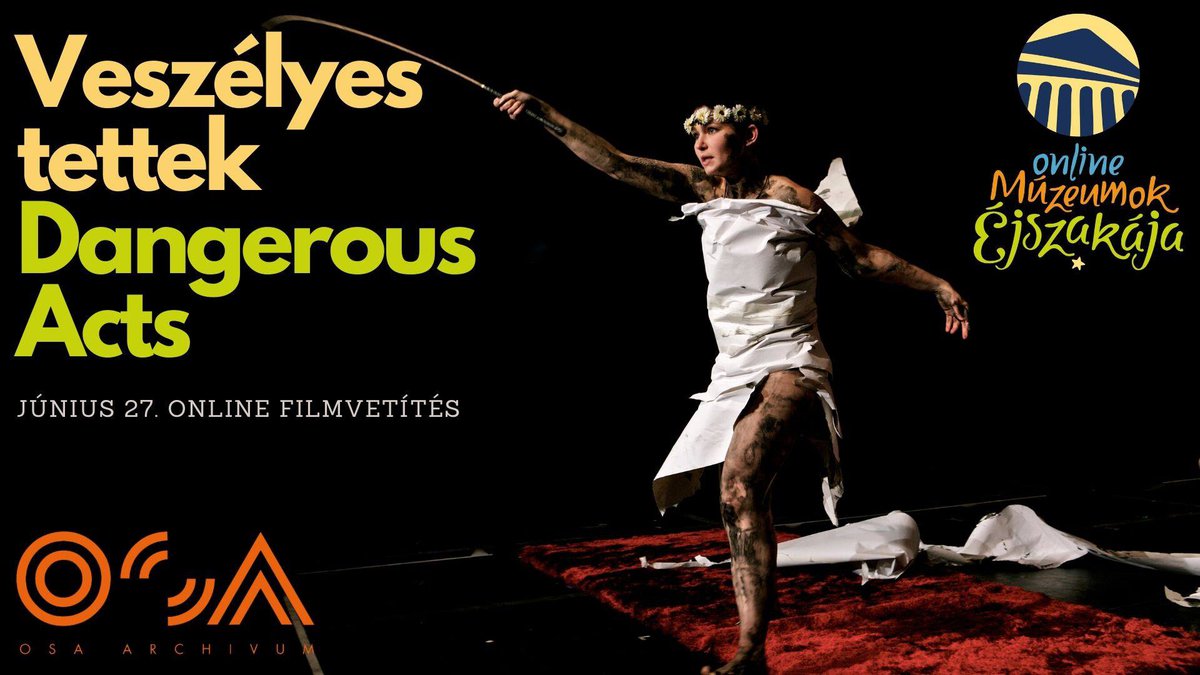
Once the Archives opened again for visitors, we hosted a physical event in the frame of the annual Budapest Pride Festival. At the Hungarian premiere screening of Indianara (d. Marcelo Barbosa, Aude Chevalier-Beaumel, Brazil, 2019, 84 min) with the COVID-19 health and safety measures in place, we could host a maximum of 50 attendees– most of whom remained for the follow-up discussion with guests Alexandra Bakony documentary film director and Tímea Orbán, vice-president of Transvanilla Transgender Association. Resonating with the topic of the film about Brazilian transactivist, Indianara, with the active participation of the viewers we discussed the infamous 33rd paragraph, that took away Hungarian trans people’s rights to change their legal name or gender.
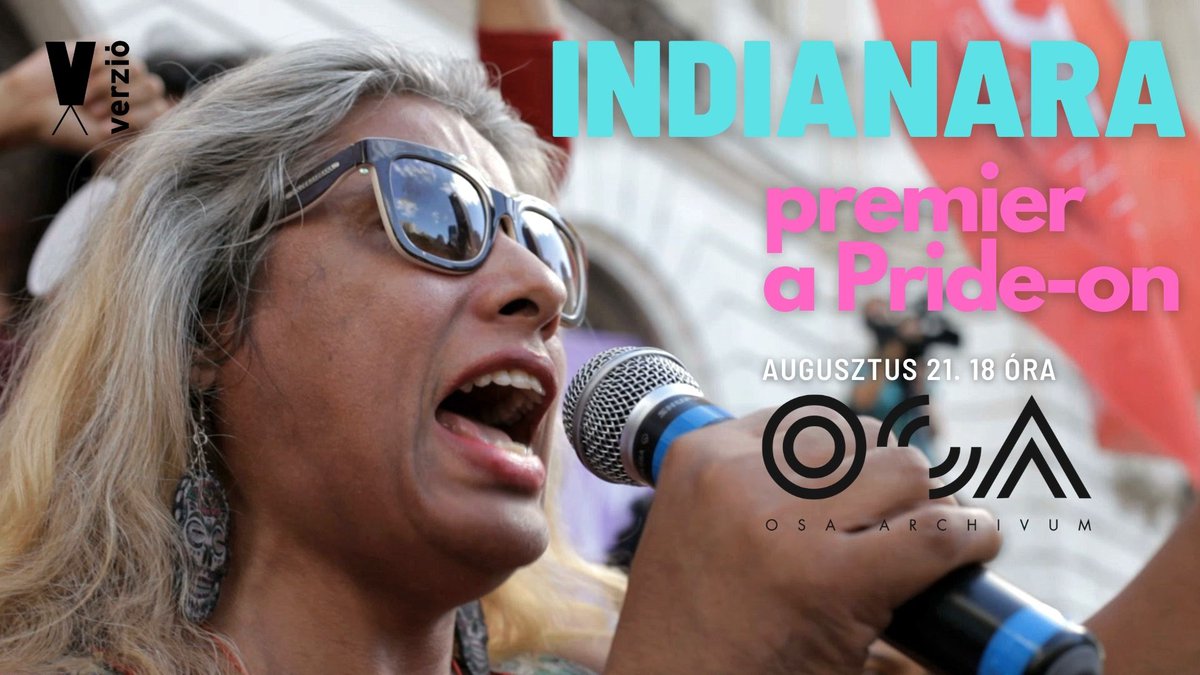
The 17th Verzió International Human Rights Documentary Film Festival was organized between 10 and 22 November 2020 exclusively online due to the risks associated with the COVID-19 pandemic. 2020 was an extraordinarily challenging year from all aspects, and it also turned out to be the year when Verzió successfully implemented the first fully online film festival in Hungary that paved the way for many future online events.
Over 20,000 people attended the festival virtually, which exceeds both the number of previous Verzió festival attendees and the general expectations. Although we missed the conversations in the cinemas, our festival crew, the audience, and the filmmakers also grieve the casualties of the worldwide pandemic. The upside of this virtual shift is that we could make the films accessible to more people than ever before. The number of online visitors from the countryside increased and they came not only from throughout Hungary but also from around the world.
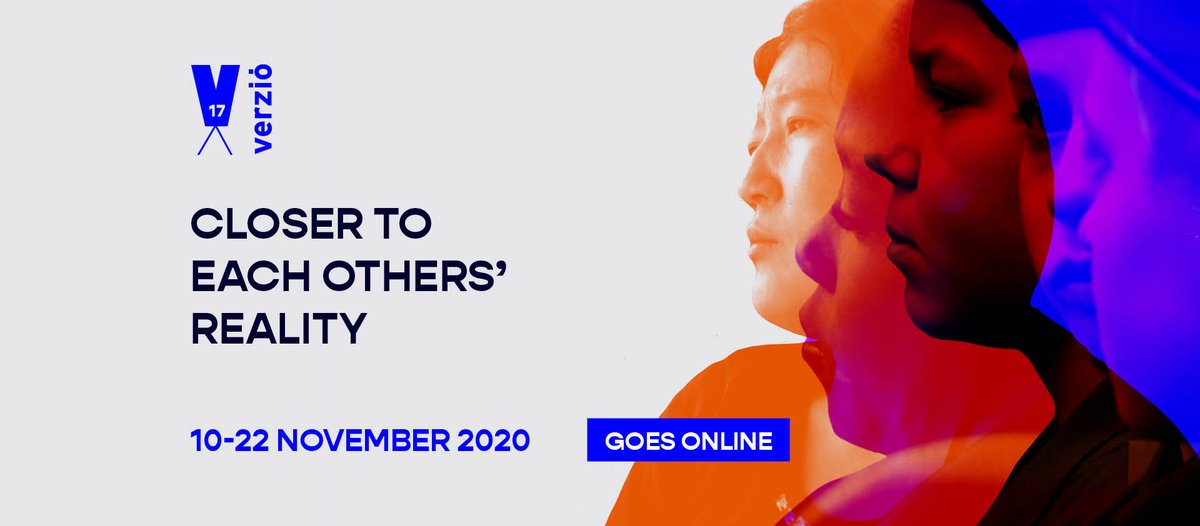
We set up our own streaming site, festival.verzio.org, with secure streaming conditions and a user-friendly design. Next to the public streaming site, Verzió maintained an industry streaming platform during the festival, industry.verzio.org, which gave free access to all the films for hundreds of our guests: film professionals including distributors, directors, producers, and festival representatives, teachers, journalists, and sponsors, our partners from cultural institutions, embassies, and NGOs.
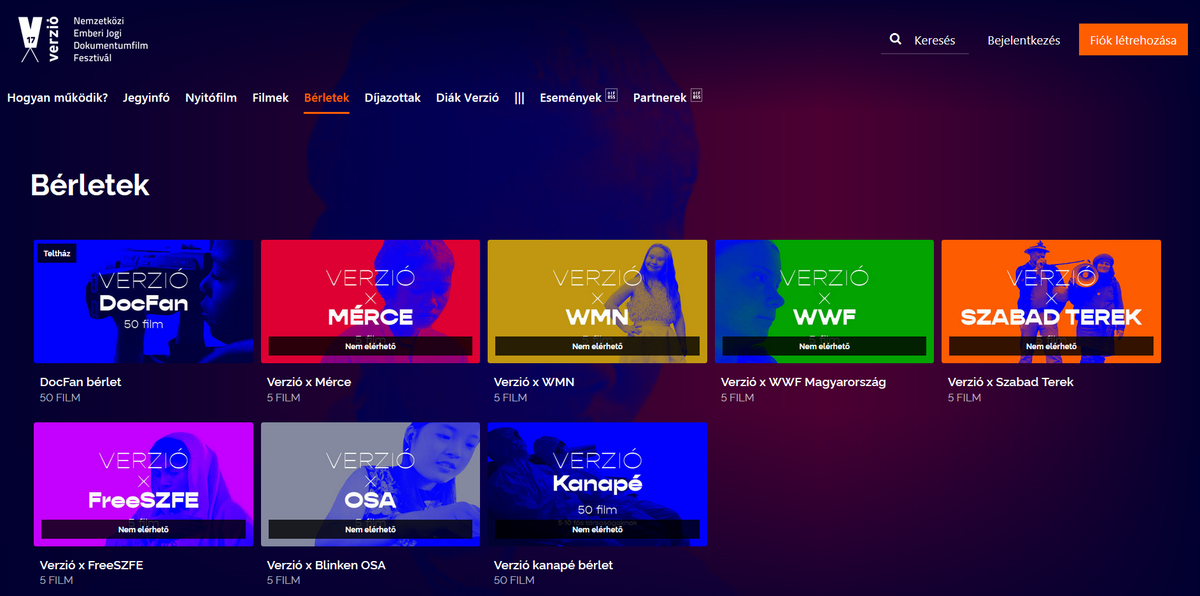
The Trafó House of Contemporary Arts has hosted the festival’s Opening Night for several years. And while we could not celebrate this year with an in-studio audience, we still broadcast the live event, from Trafó, on November 10. Fortheopening of the 17th Verzió, we invited the students of the University of Theater and Film Arts Budapest (SZFE - Színház- és Filmművészeti Egyetem) tojoinus. Nearly 40 university citizens (students, faculty, and staff) representing the free SZFEcommunity, one of the most significant protagonists of public discourse in Hungary in 2020, opened the Festival with a special performance and excerpts from a documentary film about the occupied university.
The film program included 51 films from 39 countries. The program comprised three competition sections, the International Competition, the Student and Debut Competition, and the Hungarian Competition, and four thematic sections, In the Name of Justice, Archive of the Planet, Anthropocene, and Student Verzió. Winners of each competition section were awarded a monetary prize.
Despite the lack of physical meeting space, the films were accompanied by 46 events in the course of 13 days: masterclasses, roundtables, and conversations with filmmakers, with the participation of a total of 132 international guests. The audience could choose from 14 roundtables and 12 Q&As, and 10 DocPro and Duna Dock industry events. In addition, we also hosted 6 online Student Verzió film clubs, two DJ sets, the Opening Night, and the Award Ceremony.
Round table topics included racism, the psychological impact of asylum-seeking on underage refugees, the Belarus resistance movement, climate movements, freedom of press and freedom of speech, gender issues in documentary film, the vulnerability of the LGBTQ communities, the use of archival footage in documentary cinema, student movements and participatory filmmaking, and discussions with students and debut filmmakers about their films on family matters and historical traumas.
Industry discussions were organized in cooperation with the Association of Hungarian Documentary Filmmakers (MADOKE) and DunaDock, with the participation of national and international documentary filmmakers in the fields of documentary filmmaking, financing, distribution, and festival organization. Topics included gender inequalities in the documentary film industry, the impact of the current situation on film festivals, and the changed circumstances of film education institutions and their best practices. Master-classes were also given by renowned film professionals such as Peter Kerekes, Nenad Puhovski, Atanas Georgiev, and Tue Steen Müller.
The screenings of Student Verzió were fundamentally reshaped by the pandemic situation. High school students switched to digital education again in November, thus, were placed in the usual post-screening conversations with interactive, online film clubs.
The successful cooperation with universities continued in the frame of the UniVerzió program. University seminars where students can engage with different aspects of Verzió continue to be popular classes at the Budapest Metropolitan University (METU) and at the Faculty of Humanities of the Eötvös Loránd University (ELTE BTK) as well.
At ELTE BTK, Media Studies BA students pursued a course on human rights documentary film festivals and Verzió led by András Müllner. Throughthe course, students can discuss the role of human rights documentary film festivals and engage with the Festival by moderating Q&As and writing film reviews. The students’ reviews were published on the Verzió Blogduringthefestival and contributed to the visibility of the films in the program.
Verzió has established a tradition of exhibiting alternative film posters at the charity café of the Hungarian Red Cross. Posters were created by METU Graphic Design MA students; accompanying events were organized by METU Design Culture MA students. The exhibition was opened by slam poetry artist and activist Molnár Áron NoÁron on November 10.
Six films and their creators were awarded by international jurors at the online Award Ceremony on November 20. Verzió awarded the winners with 3500 euros in total. The awards of the 17th Verzió were designed by the students at the Moholy-Nagy University of Arts and Design (MOME).
Human Rights Film Award: WelcometoChechnya (USA, d. David France)
Student/Debut Film Award: Sonny (Poland, d. PawełChorzępa)
Best Hungarian Film Award: GiveMeShelter (Hungary, d. Mihály Schwechtje)
AudienceAward: Terminal Stage (Hungary, d. Ilona Gaal and Balázs Wizner)
Human Rights Special Award: The Earth is Blue as an Orange (Ukraine, Lithuania, d. Iryna Tsilyk)
Student/Debut Special Award: Stunned, I RemainAlert (Brazil, d. Lucas H. Rossi dos Santos and Henrique Amud)
Verzió’s media partners were the largest independent news platforms: 24.hu, HVG.hu, 444.hu, telex.hu and among the new partners there were merce.hu and wmn.hu. The general press coverage counts more than 200 appearances including printed and online press, TV and radio interviews.
PARTNERSHIP AND COOPERATION
During the more than a quarter of a century of its existence, Blinken OSA has established cooperation and partnerships with a host of organizations, both for specific projects and in terms of lasting cooperation. 2020 was particularly rich in establishing new partnerships and actively using existing ones.
An outstanding group of these partnerships is connected to the region of the former Yugoslavia, reflecting Blinken OSA’s specific attention and expertise, as well its significant collection in this area. Perhaps the most important new partnership established in 2020 was Blinken OSA’s participation in the founding of a new institution, the Center for the Srebrenica-Potocari Memorial and Cemetery for the Victims of the 1995 Genocide. The establishing of the Center was essentially based on the concept worked out by Csaba Szilágyi, who is representing OSA in this partnership, which is intended to involve lasting cooperation between the two institutions. Within this framework, Blinken OSA entered into a trilateral memorandum of understanding and cooperation agreement with the Center, and the Dutch peace organization PAX.
Blinken OSA entered another trilateral agreement with the Historical Museum of Bosnia and Herzegovina and David Rohde, who had deposited his documents pertaining to the Srebrenica genocide in OSA. David Rohde gave his consent to the digitizing of his documents and the provision of a copy of the digitized documents to the Museum in order to make it available online. The documents are already available on Blinken OSA’s Digital Repository and now will also be available in the country whose history these documents refer to.
We contributed to a new project of an old partner institution: the St. Petersburg chapter of Memorial Society (Moscow), together with the Higher School of Economics (St. Petersburg) started a project entitled Islands of Freedom. The online platform of the project makes public stories of dissent and personal resistance to authoritarian regimes. Blinken OSA digitized documents from the RFE/RL published and unpublished Samizdat collection and other documents on dissidents in the so-called “Soviet Red Archives” requested by our St. Petersburg colleagues, and, after obtaining the consent of the Radios to the publication of the documents, is to transfer the files to the partner institutions. This specific project started in late 2020 and will be concluded in 2021.
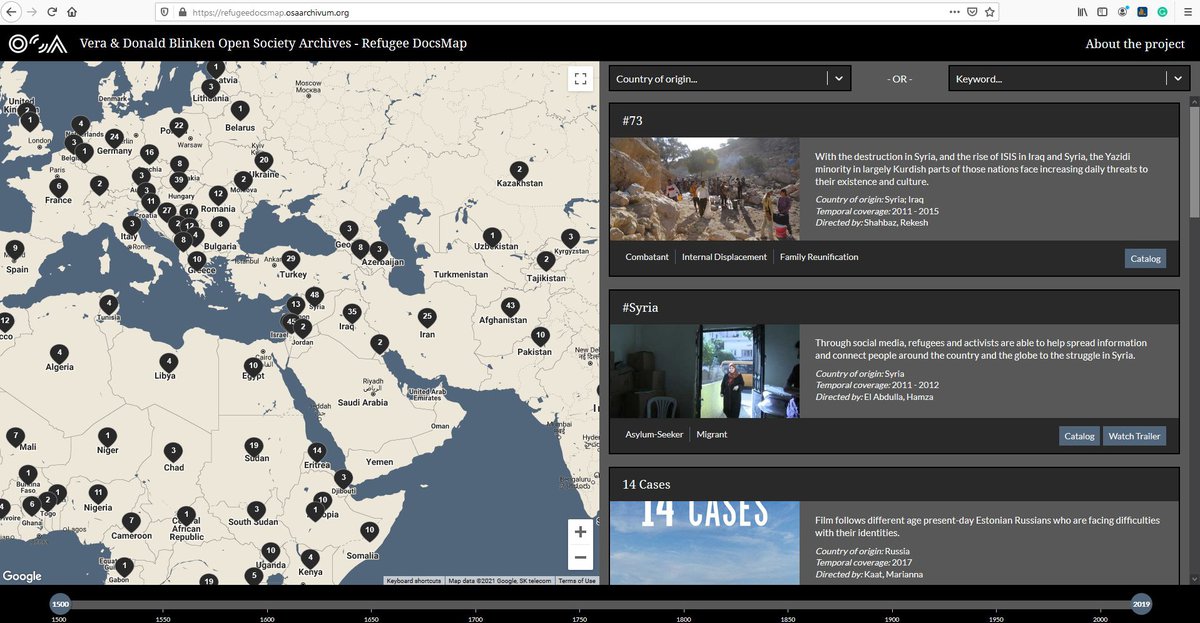
As a continuation of well-working educational cooperation, Blinken OSA hosted an intern from George Mason University, USA, Elizabeth Hardiman, who was working on Refugee DocsMap, a visual catalog of several hundred films from OSA’s film collection relating to forcibly displaced people, refugees, involves and migrants. The interactive online map of Refugee DocsMap includes an integrated timeline and summaries of each film, as well as the trailers of the films.
A recently established educational cooperation was formed with Al-Quds Bard College for Arts & Sciences (Palestine)in order to prepare and submit a proposal for an OSUN teaching program entitled Transitional Justice and the Arts Program.
As all exhibitions and public programs, physical or online, involve preliminary research work, some of this research also involve cooperation between several contributing organizations in Hungary and abroad. The planned exhibition on LGBT+ histories in Central and South Europe from the period 1945-1999 (finally opened in 2021 in an online form, due to the restrictions) involved cooperation with Háttér Archive and Library, Hungary, as well as with Arhiv SKUC (Magnus, LL) and Roza KLUB, Slovenia, with the intention of collecting material not only for the exhibition but also with the aim of establishing an LGBT+ collection in Blinken OSA. This way the new collection could serve as the basis of a future regional archive in this field.
Our biggest educational project based on cooperation between various institutions and individuals was “1989, Bringing It Home”. Using the financial support of the US Embassy in Budapest, DIA (Foundation for Democratic Youth), TTE (Association of History Teachers) and five schools from across Hungary realized an innovative teaching program (including screen printing, music installation, walking tours, zine-making, online exhibit) based on historical documents from Blinken OSA’s holdings. (The project on an innovative online platform was finally realized in early 2021).
A different type of cooperation was established with the editors of Budapest Weekly, the first independent English language newspaper in Hungary after the fall of Communism, founded in March 1991 and printed until 1998, in order to preserve, digitize, process and make publicly available the issues of the first four years of the newspaper. The collection may be complemented with background documents and photos in the future.
Last but not least, the institution which lay behind our foundation, and so far has been the origin of the largest collection, with which we have the longest history of cooperation, Radio Free Europe / Radio Liberty, recently set up a new Hungarian Service, reacting to the adverse political and communication changes in the country. We established cooperation with the new Hungarian Service, providing ideas and historical documents from Blinken OSA’s RFE/RL collections for articles and blog posts, for the benefit of both organizations.
OPERATIONAL OVERVIEW
In 2020 Blinken OSA’s core budget, about 2 % of the total budget of the Central European University, comfortably covered Blinken OSA’s basic professional operations. For the past 15 years, this budget has been complemented with an annual grant of $237,000 from the Open Society Foundations (OSF), against appropriate application and on condition of regular reporting. These two financial pillars make it possible for Blinken OSA to implement all its records management and archival activities relating to both the Open Society Foundations network and the Central European University, its extensive processing and digitization operations, its mission-related public programs for students and researchers as well for the general public, and its internationally acclaimed multi-year audio-visual preservation project aiming to save about 14,000 hours of endangered VHS recording, mostly related to the early years of the Central European University and the Soros Foundations Network.
The Visegrad Scholarship at OSA grant scheme started in 2010, bringing in EUR 34,500 for OSA annually, out of which 15 full grants of 2,000 EUR each are awarded each year Grants for shorter periods are pro-rated.
In the years between 2010 and 2020, one hundred seventy-six grants were awarded with applications arriving from at least 50 countries across all five continents. The list of the most-researched topics and the publications of Visegrad Scholarship at OSA Fellows between 2010 and 2019 based on their research in the Blinken OSA collections is available at
http://www.osaarchivum.org/work-with-us/fellowship/visegrad-scholarship/report-2010-2019
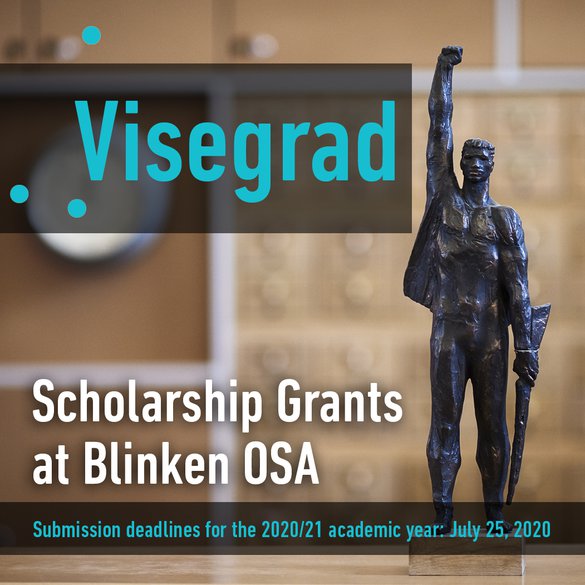
In 2020 Blinken OSA carried on its educational project for non-Budapest-based secondary school students, focusing on the anniversary of the regime change in 1989 from the award for an extended one-year support from the Embassy of the United States of America.
Despite the restrictions caused by the Covid-19 epidemic, in 2020 OSA put all its financial resources to good use and not only managed to cover its archival and records management tasks but also moved its public program activities online; meanwhile, it maintained its overall financial balance throughout the year.
2020 was marked by the uncertainties imposed both by the Covid-19 epidemic and by the changing institutional and academic environment resulting from the move of the Central European University from Budapest to Vienna. Both put additional strains emotional as well as practical, on the community of Blinken OSA. The 2019/20 and 2020/2021 academic years took many of Blinken OSA’s short-term CEU student staff away from the country.
At the end of 2020, the staff of OSA numbered 41, although this figure fluctuated over the year, as some new colleagues were only contracted for a definite term. Out of the 41 colleagues, 9 had short-term contracts, 1 colleague was on IT payroll, and OSA had a core staff of 32, of whom 27 worked on a full-time basis. The OSA staff came from 6 countries.
Tasks that the core staff of OSA could not pick up, and which could not be handled by the technological developments, were covered by externally contracted service providers, interns, and CEU students on fixed-term employment contracts. In 2020 a total of 14 interns from 7 different countries were working in OSA. Out of these 4 students came from the CEU and were employed by OSA on a fixed-term contract basis; the others, among them one Erasmus exchange student and 1 exchange student from the George Mason University in the US, worked for OSA pro bono.
In order to make all of OSA’s operations transparent and easy to follow OSA circulates the OSA Weekly, a list of events of the week, the monthly Management Meeting Brief, a summary of the Management Meeting, and after the monthly Staff Meetings the Staff Meeting Minutes. The bi-annual Financial Reports, which are followed by the Open Finance Days, where reports and operational invoices are open for inspection by the staff, also serve the purpose of transparency and open communication.
Fellowships
OSA has a long history of offering different types of fellowships, be these research grants for current Masters and Ph.D. students, individual researchers, exchange students, artists, journalists,s or even groups of researchers dedicated to certain research agenda. To date, OSA has awarded over 1,200 grants.
Currently, OSA offers only two support schemes, out of which the Visegrad Scholarship at OSA, awarded jointly with the International Visegrad Fund, supports 15 researchers a year and the Aaron Swartz Fellowshipsupports one successful candidate a year. In 2020 the Aaron Swartz Fellowship was not awarded. The Hoover Archives Research Assistance Scholarship, offered jointly with the Freedom Broadcasting Foundation, (formerly the RFE/RL Fund) supporting distant research in the Hoover Archives was dormant in 2020 while reconstruction work was carried out in the Hoover Archive.
The Visegrad Scholarship at OSA scheme, offered jointly with the International Visegrad Fund, was awarded to 17 Visegrad scholars; due to the epidemic, only 7 could start their research in OSA, all of whom gave their respective university-wide online presentation within the framework of the Visegrad Scholarship at OSA Lecture Series. The list of successful candidates and their research reports can be accessed under http://www.osaarchivum.org/work-with-us/fellowship/visegrad-scholarship/winnners-and-reserves